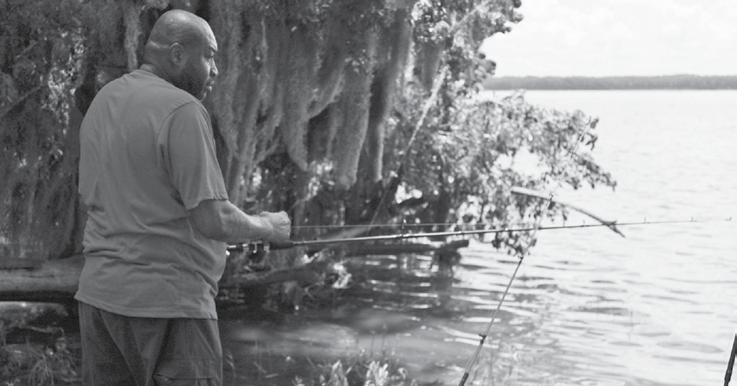New state legislation leads to "brain drain," concerns among UF faculty
CURRENT, FORMER PROFESSORS SHARE DISMAY WITH UF, THE STATE
By Garrett Shanley
Alligator
Staff Writer
UF agronomist and former chair of the agronomy department’s DEI committee
Deah Lieurance began casually exploring job opportunities outside UF in 2022.
Recent higher education state legislation targeting marginalized communities spurred Lieurance’s job search, she said.
“I wouldn’t have been looking if it weren’t for what’s happening in the state,” Lieurance said. “As things intensifed, I started looking a little more closely.”
The Florida House of Representatives audited UF in January for a list of DEI employees, their salaries and all communications. Lieurance’s communications were searched because of her position on the IFAS DEI Committee.
Four months later, Lieurance accepted a job offer at Pennsylvania State University as assistant professor of invasive species science and management.

That same month, DeSantis signed SB 266 into law. The bill limits funding toward DEI initiatives at state universities, implements a new post-tenure review system, and prohibits general education courses from teaching “theories that systemic racism, sexism, oppression and privilege are
SEE
BRAIN DRAIN, PAGE 4
Afordable housing, tenancy legislation impact Gainesville residents
THE LAWS INVEST IN AFFORDABLE HOUSING BUT PUT TENANTLANDLORD RELATIONSHIPS UNDER STATE CONTROL
By Amanda Friedman Alligator Staff Writer
When Tina Days, a 44-year-old mother of four, drives through Gainesville to deliver
SPORTS/SPECIAL/CUTOUT
Name, image and likeness
DoorDash orders, she is always taken aback by the increasing number of lavish apartment complexes cornering UF's campus.

Days owns a home in Highland Court Manor, a neighborhood in East Gainesville. She decided she wanted to sell her home and rent an apartment in 2019 due to the stress of ongoing maintenance issues.
She couldn’t fnd a rent price in her area below her monthly mortgage payment after a month of searching.
Disapproved by DeSantis

"It was so ridiculous," she said. "I just gave up. There's no [affordable] family housing."
Four years later, local housing costs have only increased.
The median price of a home in Gainesville is $272,000, a 5.2 percent increase from the previous year. Gainesville’s median apartment rent sits at $1,692 as of June 2023, a roughly 8 percent increase from June 2022 and nearly 30 percent increase from July
2020.
The UF Shimberg Center for Housing Studies’ most recent brief reported 36 percent of Alachua County low-income renters put more than 40 percent of their income toward housing.
This follows the statewide trend of rising housing costs. Florida gained roughly 600,000 units with rents above $1,000 and
SEE HOUSING, PAGE 4
FOLLOW US ONLINE FOR UPDATES
Story descripton fnish with comma, pg#
UF student athletes voice opinions on new legislation.
Read more on pg. 15.
Explaining four failed bills of the 2023 season, pg. 7 Caiman Ley migratoria Legislación estatal impacta a estudiantes y familias, pg. 8
@FloridaAlligator @TheAlligator_ @TheAlligator @theforidaalligator
We Inform. You Decide. www.alligator.org Not officially associated with the University of Florida
JULY 31, 2023 VOLUME 117 ISSUE 42
MONDAY,
Graphic by Diego Perdomo // Alligator Staf
Two dead after shooting on University, more injured
GPD IS STILL SEARCHING FOR THE SUSPECTS
Ella Thompson Alligator Staff Writer
A shooting Sunday morning killed two people and left several others injured near 900 West University Ave.
Offcers conducting crowd control as Gainesville bars closed were in the area when the unknown suspects fred multiple gunshots at approximately 2:42 a.m., according to a Gainesville Police Department Facebook post.
GPD offcers made contact with several victims, according to the post. One victim was in surgery as of Sunday morning, GPD spokesperson Joe Castor said.
GPD could not comment further as of Sunday afternoon, but expects to have more information Monday. There is no more information regarding suspects or additional victims at this time.
@elladeethompson ethompson@alligator.org
Faculty dissatisfaction
BRAIN DRAIN, from pg. 1
inherent in the institutions of the United States and were created to maintain social, political and economic inequities.”
“Nobody’s really comfortable being put on lists in the governor’s offce,” Lieurance said. “At a certain point, you have to protect yourself.”
Lieurance will offcially leave UF in September after ten years at the institution.
She is one of more than 730 employees who have resigned from UF in 2023, the Tampa Bay Times previously reported. In 2022, 1,087 UF employees resigned — the only time that number has exceeded 1,000 in the past fve years.
The exodus of UF faculty potentially comes after Gov. Ron DeSantis signed into law a series of bills reforming higher education.
Meera Sitharam, president of the UF chapter of the United Faculty of Florida, thought legislation like SB 266 has set off alarm bells within the union, she said.
“[In a normal year], people are primarily concerned about meat and potatoes issues, like what their salary is going to be,” Sitharam said. “But this year is different. I think people are much concerned about the attacks on academic freedom.”
Affordable housing
families, she said.
Sitharam believed the passage of the bill is a key factor in recent faculty departures.
However, Sitharam believes it is too soon to determine the effects of state politics on UF’s workforce.
Despite speculation of “brain drain”, which is a mass departure of skilled workers, the overall faculty turnover has not seen a substantial increase.
The current faculty turnover rate is 9.2 percent, according to a UF Human Resources report.
Before the COVID-19 pandemic, faculty turnover at UF sat at 8.9 percent.
Current data might not tell the full story, said Sean Trainor, a Warrington College of Business professor and vice president of UFF-UF.
“The statistical picture is not yet clear,” Trainor said. “What I think is clear, at least anecdotally, is that UF is having a terrible time replacing folks, particularly in politicized felds.”
The turnover rate hasn’t changed, Trainor said, but the behavior of departing faculty has.
“The critical difference is that if you leave because you're pursuing what you see as a better opportunity, you're not going to go to your new school and talk a lot of trash,” Trainor said. “I think the folks who are leaving now are going to be negative ambassadors for both the state of Florida and
Maryam Jamshidi, a former Levin College of Law associate professor, resigned from UF in May.
Jamshidi, who writes and teaches international law and national security, felt like she couldn’t do her scholarship in the way she wanted to at UF.
“I'm never going to not write about things that don't have a political angle to it,” Jamshidi said. “I couldn't teach in the classroom or do my scholarship in the way I wanted to in an environment like UF.”
Jamshidi began to lose faith in UF’s political autonomy prior to the passage of state legislation.
“The law school already felt like it was being compromised,” Jamshidi said. “The state-level stuff just made it totally untenable.”
Along with Jamshidi, other UF law professors found the university to be an unhealthy work environment.
A UF Faculty Senate report released in June found “twentyfve faculty have left [the Levin College of Law], including all fve African American faculty; those who left said they ‘cannot teach here anymore.’
Jamshidi began as an associate professor at the University of Colorado-Boulder’s law school in June. She already feels the school has done more to ensure academ-
ic freedom than UF.
“There were statements made by various high-level members of the administration at CU expressing commitment to those values that were being eviscerated,” Jamshidi said.
UF did little to assure faculty about their commitment to those values, she said.
“There was no public response to the attack on academic freedom,” Jamshidi said. “I think the school has taken the public stance of pretending nothing is happening.”
However, not all concerns about faculty retention center around academic freedom.
Paul Ortiz, a UF history professor, thought low pay is driving faculty away from UF.
“We’re not making the types of offers that a top fve university should be making,” Ortiz said. “Frankly, no one outside of Florida is going to see us as a top fve university as long as that continues to exist. It’s like a ticking time bomb against us.”
For Jamshidi, money wasn’t a factor in her departure from UF. She took a pay cut for an associate professor position at the University of Colorado-Boulder.
“I don't care how much money they would have thrown at me,” Jamshidi said. “If it had been the way it is now, I would have never come [to UF].”
@garrettshanley
gshanley@alligator.org
lost about 277,000 units renting for $1,000 or less between 2012 and 2021, according to the brief.
Two recently enacted laws — Senate Bill 102 and House Bill 1417 — seek to address Florida’s ongoing affordable housing crisis by investing in state housing programs and rescinding local tenant regulations.
Local city offcials, researchers, nonproft members and residents have mixed feelings about how the laws will impact Gainesville’s affordable housing initiatives and policies.
SB 102, also known as the Live Local Act, aims to support the development of affordable housing across the state.
The law preempts local governments’ zoning, density and height requirements for affordable housing developments in commercial or mixed-use areas, expands tax incentives for developers, bars local governments from imposing rent control policies and allocates $711 million to state affordable housing programs.
Days hopes the Live Local Act promotes the construction of affordable, single-family housing near her neighborhood. Most of the lowest-priced homes in her area are not affordable for lower-income
“What do you defne as affordable housing, is it more than $150,000?” she said. “That's not affordable.”
Gainesville city offcials have made contradictory decisions concerning affordable housing over the past year.
In February, the city announced it would put $7.2 million toward affordable housing grants. However, the Gainesville City Commission voted to bring back exclusionary zoning policies in April, making it more diffcult for developers to build affordable housing in certain neighborhoods.
Anne Ray, the Shimberg Center’s manager of the Florida Housing Data Clearinghouse, supports the Live Local Act’s provisions that fund state affordable housing programs as working wages cannot compete with rising housing costs.
Whether or not Gainesville benefts from the Live Local Act lies in the hands of city and county offcials, Ray said.
“They’re gonna be in competition with each other for limited state resources, so the city and county really need to jump on this,” she said.
The bill expands and protects funding for programs like SAIL, which provides low-interest loans to developers, and SHIP, which incentivizes local governments that
enter partnerships to develop affordable housing, she said.
Vishnu Malhotra is a 19-yearold lead at Gainesville Is For People, a local chapter of the national nonproft dedicated to housing affordability YIMBY Action. The Live Local Act is a step in the right direction, he said.
“This is a positive piece of legislation,” he said. “It fnally shows Florida is at least recognizing that we have one of the worst affordable housing crises in the nation.”
A major achievement within the bill is the loosening of certain requirements that previously hindered developers from building affordable housing in mixed-use, industrial and commercial areas, he said.
While opposers of the Live Local Act criticize its provision banning local governments from imposing rent control, Malhotra believes rent control policies have historically yielded unfavorable outcomes.
“It tends to discourage development of new housing units and we know that everywhere across the country there’s a massive shortage,” he said.
Malhotra hopes the expanded funding provided through Live Local inspires city offcials to bring more affordable housing developments to West Gainesville. The majority of existing affordable developments are on the Eastside, he said.
“We have a long and checkered history of putting affordable housing in neighborhoods that are more often than not populated by people of color,” he said. “Concentrating affordable housing in certain regions can lead to worsened poverty, less development and more crime.”
HB 1417 strips control of the tenant-landlord relationship away from local governments and transfers it to the state, forcing counties and municipalities to repeal their tenant bill of rights ordinances. The law also allows landlords to charge tenants a monthly, non-refundable fee rather than requiring a security deposit.
Alex Hood is a 21-year-old assistant coordinator with the Alachua County Labor Coalition and a political science student at Santa Fe College. He walks dogs and housesits at times to make his monthly rent payments.
“When I pay rent every month there's no money in my bank account left,” he said.
Hood supports the development of new affordable housing but worries the state takeover of the tenant-landlord relationship will spark discrimination from landlords against tenants.
“It’s important that [the city is] able to step in when developers and landlords aren’t being fair to their tenants,” he said. “Whether
that's discriminating on the basis of their gender or their lawful source of income.”
The Gainesville City Commission discussed both bills at a general policy meeting July 27. Although the commission praised the funding of state affordable housing programs, HB 1417 and the preemptive provisions of the Live Local Act cast a shadow over the discussion.
The commission voted to begin drafting an ordinance to repeal Gainesville's Rental Housing Ordinance, which was introduced in 2020 and includes a tenant bill of rights.
City Commissioner Reina Saco, who helped establish the ordinance, was hurt to see her years of work be struck down by the state, she said. Tenants saw the ordinance as a source of relief as they could seek help from the city with landlord conficts.
Moving forward, the city commission will focus on land use and zoning policies to support the development of affordable housing.
“As a commission, we need to acknowledge the very frank reality of what is no longer accessible to us and look at the tools that are in the box,” she said.
4 ALLIGATOR MONDAY, JULY 31, 2023
[UF].”
@amandasfriedman afriedman@alligator.org HOUSING, from pg. 1
Have an event planned? Add it to the alligator’s online calendar: alligator.org/calendar
Taking a stand: Student Senate legislation condemns DeSantis’ bills
The legislation references new higher education laws and more
By Vivienne Serret Alligator Staff Writer
Some UF Student Government members have made it a point to submit legislation in solidarity with students who may be affected by the new Florida laws.
The SG legislation mentions some of the state laws affecting Diversity, Equity and Inclusion programs, public-employee unions and the frst amendment.
In Spring 2022, Senators from the Gator and Change party sponsored the Resolution Condemning the “Don’t Say Gay” Bill.
Former Senate President Elizabeth Hartzog signed the resolution.
Sen. Anghelo Gangano (Change-Graduate) wrote two pieces of legislation recently passed in the Senate Chambers. He authored them after new state laws went into effect July 1.
One bill is the Resolution Condemning Florida House Bill 1069 and the Censorship, Restriction, and Removal of Educational Resources from Florida Schools.
The resolution aims to show students the Senate condemns actions and legislation that would censor, restrict or remove educational resources from any academic institution, and denounces the environment of fear and intimidation such policies create.
tion passes may vary depending on the author.
Some resolutions pass as an expression of sentiment, while others might lead to action on behalf of the entity that receives it, Santiago Perez said.
Majority Party Leader Simone Liang (ChangeCLAS) helped co-author a resolution condemning Senate Bill 266. The resolution urged Student Body President Olivia Green and UF President Ben Sasse to publicly state their support for DEI initiatives at UF.
Liang found it important for the co-authors of SSB 2023-1051 and her to issue a critical statement about their unwavering support for DEI initiatives at UF following the threatening language of SB266, which was signed into law by DeSantis, she wrote.
According to Liang, she does not believe Green has issued a public statement following the passing of SSB 2023-1051 — though, throughout the Spring 2023 election cycle, the Gator Party executive branch nominees mentioned DEI initiatives during their campaigns.
“We’re already working on these DEI initiatives, and instead of talking about what we’re doing wrong, which is clearly nothing, you need to be talking about how you’re going to work for these DEI initiatives and how you’re going to work for these students,” Green said during the SG Debate.
“I believe knowledge should be free to all students. These book bans are ant-educaton, and do not have a place in our school systems.”
Gangano believes Florida is at the center of book bans in the past few years. Countless novels have been restricted or outright removed from school districts and libraries throughout the state, often at the request of only a few individuals, creating environments where a single parent can police the reading of entire grades, he said.
“I believe knowledge should be free to all students. These book bans are anti-education, and do not have a place in our school systems,” Gangano wrote. “These bans are shown to disproportionately attack authors of color or who belong to the LGBTQ+ community, unfortunately yet another example of systemic suppression of certain voices.”
The second bill is the Resolution Condemning Florida Senate Bill 256/House Bill 1445 (2023) and their Attacks on public-employee unions. Minority Party Leader Bronson Allemand (Gator-District A) also sponsored the bill.
SB256 is a blatant act of union busting and an attack on labor forces throughout the state of Florida, including the professors and graduate assistants at UF, Gangano said.
“At a time when graduate students are already struggling with the housing crisis, infation and attaining living wages, the last thing we need is for our union to dissolve,” Gangano wrote.
Senate President Oscar Santiago Perez (ChangeDistrict D) said the courses of action after a resolu-
352-376-4458 NEWSROOM:
Engagement Managing Editor Editor-In-Chief
Digital Managing Editor
Metro Editor News Director University Editor
the Avenue Editor
Jiselle Lee, jlee@alligator.org
Kristne Villarroel, kvillarroel@alligator.org
Jackson Reyes, jacksonreyes@alligator.org
Fernando Figueroa, fgueroa@alligator.org
Aidan Bush, abush@alligator.org
Claire Grunewald, cgrunewald@alligator.org
Lauren Whiddon, lwhiddon@alligator.org
Jackson Castellano, jcastellano@alligator.org
—Sen. Anghelo Gangano (Change-Graduate)
Green issued an executive order recognizing Pride Month and supporting LGBTQ students at a June 13 Senate meeting. The order states Student Government offcials will continue the development of programs and initiatives that support LGBTQ individuals on and off UF’s campus.
Nearing the end of the July 25 Senate meeting, Santiago Perez signed two bills.
One of the bills included the Resolution Condemning Florida Board of Governors’ Decision to Ban Asian Social Media Platforms at Public Universities, authored by Budget and Appropriations Committee Clerk Michael Lim and Sen. Laurie Wang (GatorFreshman).
Per the bill’s proviso, a copy will be sent to DeSantis.
Santiago Perez said when they ran for Senate president they made a promise to advocate and protect existing DEI initiatives.
Santiago Perez is proud of the legislation that has come out through the Senate Chambers to support these initiatives and to oppose state legislative action which hinders free speech, they said.
“I hope that we continue to see the Senate continue to be proactive in these initiatives and also continue to be advocates through legislation, but also advocates through their own rights as senators.” Santiago Perez said.
@vivienneserret. vserret@alligator.org
Assistant Sports Editors
Multimedia Editors
Brandon Hernandez, bhernandez@alligator.org
Marcus Rojas, mrojas@alligator.org Diego Perdomo, dperdomo@alligator.org
Copy Desk Chief Mia Schneider, mschneider@alligator.org
Sports Editor Editorial Board
DISPLAY ADVERTISING
Advertising Office Manager
Jiselle Lee, Kristne Villarroel, Jackson Reyes
352-376-4482
Sales Representatives Cheryl del Rosario, cdelrosario@alligator.org
Sales Interns
CLASSIFIED ADVERTISING
Tessa May, Sydney Thieman, Sophia Handley, Nicole Hausmann, Avery Brennan
Kate McCroy, Brianna Rivera, Anna Grace Cofng, Madison Kahn
352-373-3463
Classified Advertising Manager Ellen Light, elight@alligator.org
352-376-4446 BUSINESS
Comptroller Delia Kradolfer, dkradolfer@alligator.org
Bookkeeper Cheryl del Rosario, cdelrosario@alligator.org
Administrative Assistant Ellen Light, elight@alligator.org
ADMINISTRATION
352-376-4446
General Manager Shaun O'Connor, soconnor@alligator.org
Administrative Assistant Lenora McGowan, lmcgowan@alligator.org
President Emeritus C.E. Barber, cebarber@alligator.org
SYSTEMS
IT System Engineer Kevin Hart
PRODUCTION
Production Manager Jordan Bourne, jbourne@alligator.org
Publication Manager Production Staff Member Deion McLeod, dmcleod@alligator.org Namari Lock, nlock@alligator.org
Got something going on? Want to see it on this page? Send an email with “What’s Happening” in the subject line to engagement@alligator.org. To request publication in the next day’s newspaper, please submit entries before 5 p.m. Please model your submissions after the above events and keep them to 150 words or fewer. Improperly formatted “What’s Happening” submissions may not appear in the paper. Press releases will not appear in the paper.

The Independent Florida Alligator is a student newspaper serving the University of Florida, published by a nonproft 501 (c)(3) educatonal organizaton, Campus Communicatons Inc., P.O. Box 14257, Gainesville, Florida, 32604-2257. The Alligator is published Monday mornings, except during holidays and exam periods. The Alligator is a member of the Newspaper Associaton of America, Natonal Newspaper Associaton, Florida Press Associaton and Southern University Newspapers.


The Alligator ofces are located at 2700 SW 13th St. © Copyright 2020. All rights reserved. No porton of The Alligator may be reproduced in any means without the writen consent of an ofcer of Campus Communicatons Inc.
Subscripton Rate: Full Year (All Semesters) $75
The Alligator strives to be accurate and clear in its news reports and editorials. If you fnd an error, please call our newsroom at 352-376-4458 or email editor@alligator.org

Not ofcially associated with the University of Florida Published by Campus Communicatons Inc., of Gainesville, Florida ISSN 0889-2423
2 ALLIGATOR MONDAY, JULY 31, 2023
VOLUME 117 ISSUE 42
Florida to vote on reinstating partisan school board elections
SCHOOL BOARD ELECTIONS HAVE BEEN NON-PARTISAN IN THE STATE SINCE 2000
By Gabriel Velasquez Neira Alligator Staff Writer



In the 2024 general election, voters will decide whether district school board candidates should run under a political affliation.
House Bill 31 proposes to amend Florida’s constitution. If passed, voters can expect to see party affliation next to the names of candidates running for district school board positions.

District school board members have been elected in nonpartisan elections since 2000. Previously, candidates affliated with a specifc party when running.

The amendment must be approved by 60% percent of voters during the 2024 elections and will not be eligible for the governor’s veto powers.
If approved, the proposed change will apply to elections during and after Nov. 3, 2026, as well as primaries leading up to the 2026 general election.
School board decisions impact everyone in a county and, regardless of party affliation, candidates should appeal to a broad base of voters, said Tina Certain, the Alachua County School Board Chair.
“It’s important to me that the race stays nonpartisan because everyone is impacted by school decisions,” Certain said. “It doesn’t matter what your political affliation is, and I think everyone should get to vote and have a voice on a candidate, not just based on your political registration during the time of the election.”
Certain frst noticed a party affliation playing a part in the elections in 2020 once Gov. Ron DeSantis began backing candidates.
“We’re seeing more politicization in education because of the governor of Florida’s actions. That is not rising up from local communities,” Certain said. “It’s coming down from Tallahassee, from the governor, down.”


In the 2022 election cycle, 20 of the 30 local school board candidates backed by Gov. DeSantis won their seats.
Daniel Clay Fisher ran for School Board District 1 but lost. For Fisher, the current political climate intersects with education regardless of whether the races were nonpartisan.
“We’d like to think that people will listen to ideas and actually judge a candidate,” Fisher said. “Unfortunately, I just think that ship has sailed and it’s a matter of which party gets out the most [to] vote is the party that’s going to win.”

Non-partisan organizations, specifcally the teachers union, historically have been affliated with the Democratic party, Fisher said.
“If your unions are lined under political par-
ties, and the vast majority of your teachers are lined under political parties, then how are you ever really going to have a nonpartisan race?” Fisher said.
Carmen Ward, president of the Alachua County Education Association, has spent 33 years in education, starting out in the Wiles Elementary School afterschool program in 1990.
The bill is an attack on the public education system, Ward said, and feels politics and education should stay separate.
“I do not think there’s any place for partisan politics in our public education system,” she said. “We should be fully focused on what’s best for students.”
The politicization of school board elections comes from a statewide attempt to erode education systems, Ward said.
“I feel like public education is under attack, and part of the attack is sowing the seeds of division,” she said. “I think this is part of the culture war strategy that is being perpetrated on classrooms, on educators and public school systems by our leadership.”
Katherine Canev, an 18-year-old incoming UF freshman and Gainesville High School graduate, believes the law would be harmful to education in the state but benefcial for rightleft-leaning counties.

“The way Congressional districts are cut, I believe that more school districts that fall into
‘red zones’ of Republican majority would fall under conservative school boards, thus expanding DeSantis’s overreach,” Canev wrote.
Canev also is unhappy with how politics has permeated recent curriculum decisions.
“DeSantis has already censored topics such as sexuality and menstruation in schools and has even mandated the falsifcation and whitewashing of history,” she said. “I’m tired of the Florida government attacking education, and I think this motion to make school board elections partisan will further their efforts to polarize education.”
The Florida Supreme Court will revise the wording of the constitutional amendments that will be presented on the ballot to ensure the language is clear and concise, said Aaron Klein, the director of communications and outreach with the Alachua County Supervisor of Elections Offce.
Currently, it is unclear where the question will appear on the ballot. However, Klein wants to make it clear that the top of the ballot is not the only important part of the ballot.
Statewide primaries begin August 2024. Voters can check their voter registration status by calling the Alachua County Supervisor of Elections Offce.

@gvelasquezn gvelasquezneira@alligator.org




MONDAY, JULY 31, 2023 ALLIGATOR 3 9 PLEASE MAKE SURE THE PHONE NUMBER, SPELLING AND CONTACT INFO IS CORRECT. $ 1 50 /LB* *20lbs Minimum charge 3830 sw 13th st, 32608 Fresh laundry & cafe first time orders SAVE20 save 20% WE SPECIALIZE IN: HVAC Repair, Installa�on, & Maintenance Duct & Dryer Vent Cleaning · Heat Pump Installa�on Furnace Repair Indoor Air Quality Services BE COOL INVEST IN ENERGY GATORACREPAIR.COM 352 275-4827 WE SPECIALIZE IN: · HVAC Repair, Installa�on, & Maintenance · Duct & Dryer Vent Cleaning · Heat Pump Installa�on Furnace Repair Indoor Air Quality Services GATORACREPAIR.COM 352-275-4827 WE SPECIALIZE IN: · HVAC Repair, Installa�on, & Maintenance · Duct & Dryer Vent Cleaning · Heat Pump Installa�on · Furnace Repair · Indoor Air Quality Services BE COOL GATORACREPAIR.COM 352-275-4827 WE SPECIALIZE IN: HVAC Repair, Installation, & Maintenance Duct & Dryer Vent Cleaning Heat Pump/Furnace Install Gas & Solar Water Heaters UF Alumni (2005) owned/operated $599 AFTER APPROVAL EXTRA PERKS, NOT EXTRA PRICE: RATES AS LOW AS SCAN HERE COME TOUR 7 DAYS A WEEK FOR MORE INFO ROOMMATE MATCHING 8 LARGE STUDY ROOMS & QUIET LOUNGE AREAS KEYCARD SECURE ENTRY FREE GUEST PARKING PRIVATE BEDROOMS, BATHROOMS & CLOSETS 3 FITNESS CENTERS RESORT STYLE POOL AND MUCH, MUCH MORE! GET $1000 GIFTCARD TOUR & SIGN PLUS GET
Two dead after shooting on University, more injured
GPD IS STILL SEARCHING FOR THE SUSPECTS
Ella Thompson Alligator Staff Writer
A shooting Sunday morning killed two people and left several others injured near 900 West University Ave.
Offcers conducting crowd control as Gainesville bars closed were in the area when the unknown suspects fred multiple gunshots at approximately 2:42 a.m., according to a Gainesville Police Department Facebook post.
GPD offcers made contact with several victims, according to the post. One victim was in surgery as of Sunday morning, GPD spokesperson Joe Castor said.
GPD could not comment further as of Sunday afternoon, but expects to have more information Monday. There is no more information regarding suspects or additional victims at this time.
@elladeethompson ethompson@alligator.org
Faculty dissatisfaction
BRAIN DRAIN, from pg. 1
inherent in the institutions of the United States and were created to maintain social, political and economic inequities.”
“Nobody’s really comfortable being put on lists in the governor’s offce,” Lieurance said. “At a certain point, you have to protect yourself.”
Lieurance will offcially leave UF in September after ten years at the institution.
She is one of more than 730 employees who have resigned from UF in 2023, the Tampa Bay Times previously reported. In 2022, 1,087 UF employees resigned — the only time that number has exceeded 1,000 in the past fve years.
The exodus of UF faculty potentially comes after Gov. Ron DeSantis signed into law a series of bills reforming higher education.
Meera Sitharam, president of the UF chapter of the United Faculty of Florida, thought legislation like SB 266 has set off alarm bells within the union, she said.
“[In a normal year], people are primarily concerned about meat and potatoes issues, like what their salary is going to be,” Sitharam said. “But this year is different. I think people are much concerned about the attacks on academic freedom.”
Affordable housing
families, she said.
Sitharam believed the passage of the bill is a key factor in recent faculty departures.
However, Sitharam believes it is too soon to determine the effects of state politics on UF’s workforce.
Despite speculation of “brain drain”, which is a mass departure of skilled workers, the overall faculty turnover has not seen a substantial increase.
The current faculty turnover rate is 9.2 percent, according to a UF Human Resources report.
Before the COVID-19 pandemic, faculty turnover at UF sat at 8.9 percent.
Current data might not tell the full story, said Sean Trainor, a Warrington College of Business professor and vice president of UFF-UF.
“The statistical picture is not yet clear,” Trainor said. “What I think is clear, at least anecdotally, is that UF is having a terrible time replacing folks, particularly in politicized felds.”
The turnover rate hasn’t changed, Trainor said, but the behavior of departing faculty has.
“The critical difference is that if you leave because you're pursuing what you see as a better opportunity, you're not going to go to your new school and talk a lot of trash,” Trainor said. “I think the folks who are leaving now are going to be negative ambassadors for both the state of Florida and
Maryam Jamshidi, a former Levin College of Law associate professor, resigned from UF in May.
Jamshidi, who writes and teaches international law and national security, felt like she couldn’t do her scholarship in the way she wanted to at UF.
“I'm never going to not write about things that don't have a political angle to it,” Jamshidi said. “I couldn't teach in the classroom or do my scholarship in the way I wanted to in an environment like UF.”
Jamshidi began to lose faith in UF’s political autonomy prior to the passage of state legislation.
“The law school already felt like it was being compromised,” Jamshidi said. “The state-level stuff just made it totally untenable.”
Along with Jamshidi, other UF law professors found the university to be an unhealthy work environment.
A UF Faculty Senate report released in June found “twentyfve faculty have left [the Levin College of Law], including all fve African American faculty; those who left said they ‘cannot teach here anymore.’
Jamshidi began as an associate professor at the University of Colorado-Boulder’s law school in June. She already feels the school has done more to ensure academ-
ic freedom than UF.
“There were statements made by various high-level members of the administration at CU expressing commitment to those values that were being eviscerated,” Jamshidi said.
UF did little to assure faculty about their commitment to those values, she said.
“There was no public response to the attack on academic freedom,” Jamshidi said. “I think the school has taken the public stance of pretending nothing is happening.”
However, not all concerns about faculty retention center around academic freedom.
Paul Ortiz, a UF history professor, thought low pay is driving faculty away from UF.
“We’re not making the types of offers that a top fve university should be making,” Ortiz said. “Frankly, no one outside of Florida is going to see us as a top fve university as long as that continues to exist. It’s like a ticking time bomb against us.”
For Jamshidi, money wasn’t a factor in her departure from UF. She took a pay cut for an associate professor position at the University of Colorado-Boulder.
“I don't care how much money they would have thrown at me,” Jamshidi said. “If it had been the way it is now, I would have never come [to UF].”
@garrettshanley
gshanley@alligator.org
lost about 277,000 units renting for $1,000 or less between 2012 and 2021, according to the brief.
Two recently enacted laws — Senate Bill 102 and House Bill 1417 — seek to address Florida’s ongoing affordable housing crisis by investing in state housing programs and rescinding local tenant regulations.
Local city offcials, researchers, nonproft members and residents have mixed feelings about how the laws will impact Gainesville’s affordable housing initiatives and policies.
SB 102, also known as the Live Local Act, aims to support the development of affordable housing across the state.
The law preempts local governments’ zoning, density and height requirements for affordable housing developments in commercial or mixed-use areas, expands tax incentives for developers, bars local governments from imposing rent control policies and allocates $711 million to state affordable housing programs.
Days hopes the Live Local Act promotes the construction of affordable, single-family housing near her neighborhood. Most of the lowest-priced homes in her area are not affordable for lower-income
“What do you defne as affordable housing, is it more than $150,000?” she said. “That's not affordable.”
Gainesville city offcials have made contradictory decisions concerning affordable housing over the past year.
In February, the city announced it would put $7.2 million toward affordable housing grants. However, the Gainesville City Commission voted to bring back exclusionary zoning policies in April, making it more diffcult for developers to build affordable housing in certain neighborhoods.
Anne Ray, the Shimberg Center’s manager of the Florida Housing Data Clearinghouse, supports the Live Local Act’s provisions that fund state affordable housing programs as working wages cannot compete with rising housing costs.
Whether or not Gainesville benefts from the Live Local Act lies in the hands of city and county offcials, Ray said.
“They’re gonna be in competition with each other for limited state resources, so the city and county really need to jump on this,” she said.
The bill expands and protects funding for programs like SAIL, which provides low-interest loans to developers, and SHIP, which incentivizes local governments that
enter partnerships to develop affordable housing, she said.
Vishnu Malhotra is a 19-yearold lead at Gainesville Is For People, a local chapter of the national nonproft dedicated to housing affordability YIMBY Action. The Live Local Act is a step in the right direction, he said.
“This is a positive piece of legislation,” he said. “It fnally shows Florida is at least recognizing that we have one of the worst affordable housing crises in the nation.”
A major achievement within the bill is the loosening of certain requirements that previously hindered developers from building affordable housing in mixed-use, industrial and commercial areas, he said.
While opposers of the Live Local Act criticize its provision banning local governments from imposing rent control, Malhotra believes rent control policies have historically yielded unfavorable outcomes.
“It tends to discourage development of new housing units and we know that everywhere across the country there’s a massive shortage,” he said.
Malhotra hopes the expanded funding provided through Live Local inspires city offcials to bring more affordable housing developments to West Gainesville. The majority of existing affordable developments are on the Eastside, he said.
“We have a long and checkered history of putting affordable housing in neighborhoods that are more often than not populated by people of color,” he said. “Concentrating affordable housing in certain regions can lead to worsened poverty, less development and more crime.”
HB 1417 strips control of the tenant-landlord relationship away from local governments and transfers it to the state, forcing counties and municipalities to repeal their tenant bill of rights ordinances. The law also allows landlords to charge tenants a monthly, non-refundable fee rather than requiring a security deposit.
Alex Hood is a 21-year-old assistant coordinator with the Alachua County Labor Coalition and a political science student at Santa Fe College. He walks dogs and housesits at times to make his monthly rent payments.
“When I pay rent every month there's no money in my bank account left,” he said.
Hood supports the development of new affordable housing but worries the state takeover of the tenant-landlord relationship will spark discrimination from landlords against tenants.
“It’s important that [the city is] able to step in when developers and landlords aren’t being fair to their tenants,” he said. “Whether
that's discriminating on the basis of their gender or their lawful source of income.”
The Gainesville City Commission discussed both bills at a general policy meeting July 27. Although the commission praised the funding of state affordable housing programs, HB 1417 and the preemptive provisions of the Live Local Act cast a shadow over the discussion.
The commission voted to begin drafting an ordinance to repeal Gainesville's Rental Housing Ordinance, which was introduced in 2020 and includes a tenant bill of rights.
City Commissioner Reina Saco, who helped establish the ordinance, was hurt to see her years of work be struck down by the state, she said. Tenants saw the ordinance as a source of relief as they could seek help from the city with landlord conficts.
Moving forward, the city commission will focus on land use and zoning policies to support the development of affordable housing.
“As a commission, we need to acknowledge the very frank reality of what is no longer accessible to us and look at the tools that are in the box,” she said.
4 ALLIGATOR MONDAY, JULY 31, 2023
[UF].”
@amandasfriedman afriedman@alligator.org HOUSING, from pg. 1
Florida’s new bathroom law prompts concern from UF students
The law requires people to only enter bathrooms aligned with assigned sex at birth
By Garrett Shanley Alligator Staff Writer

For Ryan Need, a UF Department of Materials Science and Engineering assistant professor, having a gender-inclusive restroom in their building on campus is a comfort.
“I’m lucky to have a unisex bathroom in my building, but it’s upstairs,” they said. “So, if I’m in a rush, I’ll use gendered facilities that are closer, but I don’t like to.”
A new Florida law makes that choice harder for queer UF students and faculty like Need.
Gov. Ron DeSantis signed HB 1521 into law in May, and it became effective July 1. The bill, also known as the Safety in Private Spaces Act, introduces penalties for people using a public restroom or changing facility not aligned with their sex assigned at birth.
Persons who enter certain restrooms or changing facilities and refuse to depart when asked to do so can be charged with trespass, according to the bill.
HB 1521 is meant to maintain “public safety, decency, decorum and privacy,” according to the bill’s text.
The Board of Governors must implement the bill into its state university regulations by Jan. 1, 2024.

Members of the UF community think the bill makes bathrooms less safe.
The Queer Liberation Front, a coalition of queer and transgender students fghting for liberation at UF, held protests against the legislation and is working with campus offcials to implement gender-inclusive bathrooms.
Erin Bischof, a member of the Queer Liberation Front, said the bill creates possibilities of violence and harassment against the trans and nonbinary community.
“It is a very high priority for us because there is a very high risk involved,” Bischof said. “[Under the bill], people are empowered to enact vigilante violence on those they see using the ‘wrong restroom.’”
Bischof believes reporting suspected violators of the new bill could lead to confict that otherwise wouldn’t have existed.
“If you see someone in the bathroom, mind your own business,” Bischof said. “If you’re gonna try and report them, it’s just going to escalate things. It makes things dangerous for everyone involved.”
Jonathan Stephens, president of the UF Pride Student Union, said the bill perpetuates harmful narratives surrounding the
Isabella Ferrie // Alligator Staf

trans and nonbinary community.
“I think that this has just been a clearly consistent narrative within the Florida legislature to try to reduce transgender, nonbinary and gender non-conforming individuals to some sort of predators or sexual deviants,” they said.
Need, who is also the co-chair of the UF LGBTQ+ Presidential Advisory Committee, also believes HB 1521 puts the trans and nonbinary community at risk.
“Trans and gender non-conforming individuals face an increased risk of harassment, discrimination and even violence when forced to use restrooms that do not align with their gender identity,” Need said. “Thus, it is also a matter of safety
and mental well-being for TGNC to be able to use facilities that affrm their identities.”
A 2016 study found 36 percent of trans youth subject to restroom and locker room restrictions have experienced sexual assault.
Gabriel Murchison, a postdoctoral candidate at the Yale School of Public Health and lead author of the study, said the study only establishes an association between restroom restrictions and sexual assault among trans youth.
“But they are certainly a strong indicator of environments where kids are at risk,” Murchison told CNN in 2019.
In the past, the UF LGBTQ+ Presidential Advisory Committee made efforts to increase restroom accessibility for the UF trans and nonbinary community.
“Many buildings on campus do have single occupant bathrooms that are functionally gender-inclusive, but their labeling varies, and they aren’t always easy to fnd,” Need said.

Tiffany Richards, a former LPAC member and director for UF LGBTQ Affairs, led an initiative cataloging single-stall restrooms across the UF campus.
Richards helped create a partial map of UF’s gender-inclusive and single-stall restrooms. A beta version of the map is available through the Offce for Accessibility and Gender Equity website.
Need hopes the list will be added to the offcial UF campus map, they said.
Efforts to complete the map stalled in 2022 after Richards left UF and former UF president Kent Fuchs announced his retirement.
“LPAC hopes to resume this effort soon with Dr. Sasse’s support,” Need said.
@garrettshanley gshanley@alligator.org

MONDAY, JULY 31, 2023 ALLIGATOR 5
UF’s eforts to preserve Native American History remain despite implications from new legislation
FACULTY, STUDENTS PAVE THE WAY FOR PRESERVING UF NATIVE AMERICAN HISTORY
By Jinelle Vazquez Alligator Staff Writer
Jillian Wessel, a member of the Chickasaw tribe, has advocated for on-campus spaces for Native American UF students.
“One thing that students in the past have advocated for is a physical space on campus that could provide resources specifcally for indigenous students or function as a meeting space,” Wessel said.
Wessel, a 20-year-old UF linguistics junior, understands it’s not a major priority for UF but now worries about the implications of new legislation.
“Unfortunately, I think legislation like [SB 266] will make it even harder to accomplish these kinds of goals, as diversity is something that is being directly targeted,” Wessel said. “I hope that the impact of these bills will not cause too much damage to important organizations and programs on campus.”
SB 266, a bill limiting Florida’s colleges and universities diversity, equity and inclusion funding went into effect July 1.
The law denies public colleges from “spending public dollars on initiatives that promote dangerous political and social activism, such as DEI initiatives” and offering courses “based on theories that systemic racism, sexism, oppression, or privilege are inherent in the institutions of the United States and were created to maintain social, political, or economic inequities.”
The new law prompts some worry from
the UF community about the future of Native American history at the university, while others believe their efforts to preserve the history will last.
As a land grant university, the main UF campus is located on the ancestral territory of the Potano and the Seminole peoples, according to Smathers Libraries.
The Potano, of Timucua affliation, lived in Alachua County before European arrival until the destruction of its towns in the early 1700s. The Seminole, also known as the Alachua Seminole, established towns here shortly after, but were forced out of the land as a result of a series of wars with the U.S. known as the Seminole Wars.
UF’s history with the East Florida Seminary traces back to 1853, university archivist Sarah Coates said.
The Buckman Act in 1905 combined East Florida Seminary, the Florida Agricultural College, the South Florida Military College and the St. Petersburg Normal and Industrial School to create what is UF today, Coates said.
Coates didn’t speculate on how recent legislation will ultimately affect UF.
“That will be for future historians to study and learn,” Coates said.
The Morrill Acts of 1862 and 1890 allowed state universities to receive funding through the sale of ceded, seized or stolen Indigenous lands west of the Mississippi River, according to a report by the presidential task force on African American and Native American History.
Kenneth Sassaman, the Hyatt and Cici Brown Professor of Florida Archaeology and director of AIIS, generated a proposal to reinvest UF’s endowment into Native American students.
Endowment funds exist to be an opportunity to invest in capacity for Native American studies, Native American students and to help tribes through collaborations and partnerships to achieve their goals, Sassaman said.
“Sovereignty, economic sustainability, social harmony, health, public health, those goals could create capacity to help [universities] achieve those goals,” Sassaman said.
The Native American Graves Protection and Repatriation Act of 1990 requires institutions receiving federal funds, like UF, to return sacred objects to federally recognized tribes.
“UF holds the 11th largest collection of Native American remains in the country and I know that there’s been a lot of delay in getting those remains back,” Sassaman said. “But if you look at the last couple of years, what they’ve done, they’ve accelerated the process [and] they’re being very proactive.”
The Florida Museum of Natural History received a NAGPRA grant in 2021 from the National Park Service and funded efforts to consult with tribal partners to determine where the selected items should be returned.
The museum also hired its frst full-time NAGPRA coordinator in 2022 to serve as the liaison among the museum, tribal nations, state and federal agencies and the national NAGPRA program, according to the museum.
It is Sassaman’s understanding that higher administration had to be convinced UF should hire a NAGPRA coordinator for the museum.
“Everything that’s happening is coming from the bottom up, Sassaman said. “It’s students, faculty, and even staff that are initiating any sort of change.”
Opportunities like the AIIS program, Alfred A. Cave Scholarship and Indigenous-led events are possible because of the efforts of the UF community, Sassaman said.
Sassaman believes museum directors understood the need for curators, but the Provost Offce felt differently, he said.
Sassaman understands the UF administration is caught between a rock and a hard place.
“[Administration has] probably the interest in fghting to save what the university represents and not retrograde,” Sassaman said. “But the legislators in Tallahassee control the budget … so you can’t really go against them without suffering consequences.”
However, Sassaman does not believe that SB 266 will hold up in the judicial system as “it violates so many [constitutional] rights.”
“I think that if we were a private corporation and not a state institution … we would just simply sue the state, and then it would be locked up in the legal system until it’s adjudicated,” Sassaman said. “I think ultimately, by the time it was adjudicated those who initiated this … they’re gonna be gone.”
Steven Noll, a professor in the UF Department of History, believes recent Florida legislation will have a minimal impact on the work the Samuel Proctor Oral History Program has done to preserve and teach the legacies of Native Americans on campus.
“I think it will let people think twice before doing what they want to do,” Noll said. “I’m not necessarily sure if it will prevent people from doing that. You just have to be more careful.”
@vazquezjinelle jvazquez@alligator.org
State education bill casts mixed opinions within UF Latin and Indigenous studies
FLORIDA’S CULTURAL HISTORY COULD EITHER EXPERIENCE LIMITATIONS OR AVOID THEM
By Nicole Beltrán Alligator Staff Writer
Florida’s abundant history of instruction on Latin American and Indigenous culture may face censorship, potentially undermining the historical importance of the subjects.
Among the recently passed legislation, SB 266 or the Higher Education Bill, prohibits institutions from spending money on programs or activities that “promote or engage in political or social activism,” as stated by the State Board of Education.
UF reported spending $5 million in diversity, equity and inclusion funding, which is less than one percent of its budget, back in January.
With minimal spending already recorded, the recent legislation may not cast an overwhelming budget change but could potentially hinder any remaining DEI pursuits.
Despite the concern, some UF faculty believe the bill might overlook their departments.
Luis Álvarez-Castro, a UF professor and chair of the department of Spanish and Portuguese studies, believes self-censorship will affect a general understanding of Latin American teachings.
“Issues related to race and gender are essential to properly understanding our feld of study, which is the languages, literatures, and cultures of the Spanish- and Portuguese-speaking world,” he wrote in an email.
Álvarez-Castro sees the legislation as part of a nationwide trend portraying a division between higher education and society. Economic and ideological factors also build upon it, he wrote.
“One term that has been repeatedly used is ‘indoctrination,’” Álvarez-Castro wrote. “Nothing could be further from our goal, which is to expand our students’ professional skills and foster their personal growth.”
Departments that already struggle with representation may contrarily conceal themselves from more restrictive change.
Kenneth Sassaman, a UF professor of archaeology and the American Indian and Indigenous Studies program director, said the recent legislation will have minimal impact on Indigenous studies.
“I don’t see the DEI rollbacks affecting indigenous studies at UF,” Sassaman said. “We’re really under the radar. I don’t want us to be under the radar, but we are.”
Sassaman took over the American Indian and Indigenous studies program back in Fall 2022, creating a functioning department by delegating different faculty members to different positions.
Higher UF administration may not be familiar with all the initiatives the American Indian and Indigenous studies program offers. While there is no offcial website for the department, they have endowments and funds to work with, Sassaman said.
These resources include the Alfred A. Cave Scholarship that was recently awarded to Levi Strodel, a 19-yearold UF history and political science sophomore.
“Being awarded this scholarship has allowed me to have more fexibility in my work schedule, creating more time for me to pursue my studies,” Strodel wrote. “It has also connected me with students and faculty who share my passion for indigenous activism.”
SB 266 would not directly impact these opportunities, Sassaman said.
Jesus Serrano-Vazquez, a 19-year-old UF history junior, is concerned about the bill’s impact on the student body’s dynamic, regardless of minimal change, he said.
There are many DEI tools benefting students daily, like safe environments. Serrano-Vazquez enjoys going to the Institute of Hispanic-Latino Cultures – also known as La Casita — to study, he said.
Serrano-Vasquez dedicated himself to fnding a community that he connects with, he said.
He’s the vice president of communications for Lambda Theta Phi Latin Fraternity and the Hispanic Student Association. He’s also the public relations director of the Mexican American Student Association and marketing director for Hispanic Latinx Heritage Month.
Serrano-Vasquez’s organizations, as well as others, are eager to speak out against the legislation yet worried about possible repercussions from doing so, he said.
“I know other organizations are afraid to speak out against the bill with how UF is standing and with the new president,” Serrano-Vasquez said.
Serrano-Vasquez’s fraternity is funded individually, yet he’s waiting for the fraternity to release a statewide notice speaking around the bill.
Santa Fe College Student Affairs associate vice president Dan Rodkin believes the legislation will not harm the college’s goals.
“We do not have a specifc curriculum that is identifed as DEI,” Rodkin said. “There is no impact on the classes we are offering.”
Rodkin acknowledges the legislation will have lasting effects on higher education universities and colleges, he said.
“That core mission and the work that we do at Santa Fe College does not change based on recent legislative decisions, and we’re committed to the success of our students and improving our communities,” Rodkin said. @nicolebeltg
6 ALLIGATOR MONDAY, JULY 31, 2023
nbeltran@alligator.org
Disapproved by DeSantis: The failed bills of the 2023 session
41 BILLS DID NOT PASS FLORIDA’S LEGISLATIVE SESSION
Ella Thompson
Alligator Staff Writer
About 41 bills failed to pass the 2023 Florida legislative session and local marginalized communities are now facing the consequences.
Among the bills, four of them were either vetoed by DeSantis or died in congress. The bills include implementing a teacher base salary of $65,000, encouraging public agencies to use electric cars and renewable energy, solidifying the right to same sex marriage and ensuring healthcare providers are using the correct titles.
“Save Our Teachers Act”
The Save Our Teachers Act, a bill that would’ve made public school teacher base salaries $65,000 could have improved fnances for future teachers.
The act, or House Bill 271, wanted to implement and increase the minimum base salary for full-time classroom teachers. The bill, fled Jan. 9, died in the PreK-12 Appropriations Subcommittee May 5.
Union representatives and teachers have mixed feelings about the bill, Alachua County Education Association president Carmen Ward said. On one hand, raising the minimum base salary could help with the current teacher shortage, but on the other hand, veteran teachers reap no benefts of increased base salary.
As ACEA president — an elected position — Ward obtains legal defenses, negotiates contract language and fghts for better salaries, she said. Ward’s been in the education feld for 33 years, and only left the classroom in the 2017-2018 school year to represent the union full time.
As a “policy nerd” as she calls herself, Ward knows how to dissect legislative language, she said. Reading between the lines is important, she added.
The legislation would increase the minimum base salary for full-time classroom teachers to at least $65,000, or to the maximum amount achievable based on the allocation, according to the bill.
The bill states that school districts can start teachers at $65,000 or “maximum amount achievable” but the state government doesn’t
give school districts proper funding, Ward claims.
There’s many different kinds of laws that restrict pay for teachers, Ward said.
In addition to relatively low salaries, teachers often pay for their own school supplies or work unpaid overtime, Ward said. Although, there is allocated money in teacher contracts for supplies, but it’s a “ridiculously low amount of money,” she added.
“I fgured it out one year because I was a middle school teacher,” Ward said. “I had about 150 students, and I had $150 of supply money.”
If the bill had passed, veteran teachers who have been in the feld for more than 20 years would’ve been hit the hardest. The bill did not state if veteran teachers would also get a salary increase.
New teachers would hypothetically earn $65,000 a year, and anyone under that amount would get a raise to match it. If the bill passed, veteran teachers would see no changes.
Carmen King made $19,000 when she started teaching in 1989. By 2021, her salary hadn’t improved by much.
King, 59, worked as a special education teacher and visited students in their home if they were unable to physically attend school, due to disability or illness.
During COVID-19, she assisted in the creation of county-wide curriculum to help aid the transition from classroom learning to online learning, she said. She retired before students returned to the classrooms because her husband, Chris, and herself are immunocompromised.
King was worried about the lack of fnancial security for veteran teachers, who bring priceless experience.
“They weren’t going to compensate the veteran teachers, and basically as a 30 year plus teacher, people coming straight into the feld were going to be making almost as much as I was at 32 years with a master’s degree,” she said.
King was another teacher that consistently bought her own supplies, she said, but she also gave her lunch to students and bought them jackets or deodorant if they needed it.
“I brought extra lunch for myself. Chris always made me like two sandwiches because I ended up usually giving my food away to the kids,” King said.
King knows teachers that bartend, wait tables, teach Santa Fe night courses and sell art on the side to make a little extra cash, she said. King’s parents, who were both teachers, had side gigs — her dad, a security guard and her mom, a hairdresser.
Kids are back to school Aug. 10, and as of two weeks ago, there are 100 positions left to fll in the Alachua County school district, Carmen Ward said.
Senate Bill 230: Health care Practitioner Titles and Designations
SB 230, fled Feb. 9 and vetoed by Gov. Ron DeSantis June 2 was a truth-in-advertising bill that would’ve promoted patient safety by guaranteeing healthcare providers use the correct titles and designations synonymous with their schooling, training and certifcations.
Tushar Desaraju, a 20-year-old UF nutritional sciences and predental junior, believes the qualifcations of medical professionals should be common sense and isn’t necessary to implement into law.
“The reason that med school and doctors are in school for so long to do their med school and then their residency and whatnot is so they have enough practice, and they have the credibility and they’re able to actually perform these procedures on other humans,” he said.
The bill was vetoed, much to the liking of the Florida Optometric Association. The organization released a statement that it was glad Desantis vetoed the bill, and the FOA “fought and prevailed in a challenging battle.”
The bill would have prohibited an optometrist from calling themselves a physician, and made it a felony to do so, according to the FOA. However, the bill merely prohibits healthcare providers from advertising themselves as physicians unless they are permitted to do so, according to the Florida Society of Ophthalmology
The society also says that Florida’s Optometric Practice Act never authorized optometrists to advertise as physicians and SB 230 didn’t change that.
Senate Bill 284: An act relating to energy
Adrian Santiago, a 22-year-old UF graduate and masters of urban regional planning student, sees DeSantis’ veto Senate Bill 284 as a ploy in the governor’s anti-woke campaign, he said.
“It’s a very weird and disturbing hill to die on for the Republican Party, or anybody else
who doesn’t want to take a renewable energy future seriously,” Santiago said.
Santiago thinks DeSantis does not want to be seen supporting any clean initiatives, he said.
Santiago was sad to see other energy bills fail during the legislative session. SB 970 failed, which means the Florida government won’t express an intention to invest in renewable energy, he said. A different energy bill failed in the house, adding to Santiago’s disappointment.
“Florida all the way around is just kind of fumbling the climate change crisis at the moment,” he said.
UF interdisciplinary environmental studies professor Bron Taylor has been studying climate change since the 1990s. If every university in the country were to implement electric cars or use more renewable energy, the impact would be signifcant, he said.
“The idea that it’s somehow economically counterproductive to do this kind of thing — that’s just crazy. Electric vehicles take less maintenance, you pay a little bit more upfront for a similar sized thing, you’d be paying less maintenance long term,” Taylor said.
Scientists try to underscore their work in order to avoid causing panic, Taylor said, but in the past decade scientists have been trying to sound the alarm because it’s “indisputable that there’s a climate crisis.”
“You have the equivalent of the best scientifc minds in the world standing on top of a table and shouting out alarm,” he said. “Scientists warnings to humanity that had been issued, not just once but several times, with signatories all around the world from the best scientifc minds that exist.”
Taylor noted a long history of Republican Party denial about climate science, and that much of the denial comes from greed.
“It’s astounding that even as the evidence of catastrophic climate change becomes all the more obvious, we still see no signifcant movement on the part of the GOP to acknowledge, recognize and support the movements that might ameliorate this and slow this horrible process,” he said.
There’s no jobs on a dead planet, Taylor said. • • •
Read the rest on Alligator.org
Local educators, students fear inaccurate Black history curriculum
THE CHANGES WILL NOT BE IMMEDIATELY IMPLEMENTED
ALLIGATOR STAFF REPORT
Jordan Marlowe has taught at Newberry High School for 17 years and piloted the school’s African American history class. He’s served as the class’s instructor since its inception four years ago.
History serves as a lens to understand the modern world and how problems in it came to be, the 46-year-old teacher said. If taught inaccurately or with bias, he believes educational ignorance could lead to national confict.
“When we think of America as one nation, it’s really important in order to be one community, that we all understand our history in a similar way,” Marlowe said. “When we try to teach history in different ways across the country, I think we set ourselves up for future generations of disagreements.”
Marlowe and other educators worry about the classrooms of future
students after the Florida Board of Education issued a new set of standards for African American history instruction in public schools.
The standard set was approved for the K-12 curriculum at an Orlando board meeting July 19.
The new standards require curriculum for middle school students to include “how slaves developed skills which, in some instances, could be applied for their personal beneft,” according to a document listing the curriculum posted on the Florida Department of Education.
Implying positive qualities came out of slavery can be proven false by pointing to current inequalities locally, Marlowe said.
“Wealth in Alachua County is strikingly divided along race lines, and to say that enslaved people learned skills that they were able to use to their economic beneft later on simply isn’t borne out by our history,” he said.
The newly reviewed curriculum was issued after the state passed new legislation under Gov. Ron DeSantis that prohibits school instruc-
tion from suggesting anyone is privileged or oppressed based on their race or skin color.
Beyond the newest standard changes, Marlowe said the public school system needs to better address discriminatory efforts in history after the Civil War as well.
“I think there’s a direct line between that decision — to view ending slavery as America’s only responsibility for those crimes — and the wealth disparity that we have today,” Marlowe said.
The curriculum is another development in Florida’s continuous debate about Black history, following DeSantis’ administration blocking a preparatory version of Advanced Placement African American Studies from Florida classrooms earlier this year.
Alex Lanfranconi, the director of communications for the Florida Department of Education, said the department was proud of the most recent curriculum change and acknowledged the standards were created by a group of 13 educators and academics in a statement.
“It’s sad to see critics attempt to discredit what any unbiased observer would conclude to be in-depth and comprehensive African American History standards,” Lanfranconi said. “They incorporate all components of African American History: the good, the bad and the ugly.”
NAACP President and CEO Derrick Johnson publicly condemned the new curriculum in a release statement.
“It is imperative that we understand that the horrors of slavery and Jim Crow were a violation of human rights and represent the darkest period in American history,” Johnson said.
Students like Katherine Canez, an 18-year-old UF biochemistry freshman and recent Gainesville High School graduate, also felt the new standards were deeply fawed.
The changes were a refection of the state legislature’s bigotry, she said.
“I want to come off strongly: I think this is a disgusting whitewashing of history,” she said. “I think it’s ridiculous to try to come up with
justifcations for slavery in order to alleviate white guilt.”
Canez was unable to take an African American History class in high school due to a lack of student registration, but wants to learn more through UF Quest classes.
Students and school faculties alike should oppose the legislation, she said.
“I hope that as an institution of education, we can and we do have the gall and the audacity to stand up and say, ‘I’m not taking your redacted history book,’” Canez said.
The Florida Education Association, a statewide teachers union, referred to the newly passed curriculum as a disservice to students.
Andrew Spar, the association’s president, tweeted a statement about the curriculum.
“How can our students ever be equipped for the future if they don’t have a full, honest picture of where we’ve come from?” Spar wrote.
MONDAY, JULY 31, 2023 ALLIGATOR 7
• • • Read the rest on Alligator.org
El Caim(n
www.alligator.org/secton/elcaiman
Proyecto de ley de inmigración ilegal deja efectos duraderos en las familias locales
EL PROYECTO DE LEY PODRÍA ENTORPECER LAS RELACIONES INTERPERSONALES ENTRE ESTUDIANTES Y RESIDENTES
By Nicole Beltrán Alligator Staff Writer
Mónica Trejo Aretes migró a los Estados
Unidos hace 19 años, trabajando como limpiadora de casas para mantener a sus cuatro hijos. Hace tres meses, la residente de 35 años de Haines City, Florida, inició su propio negocio, un mercado de frutas y verduras llamado Produce Martin.
A pesar de su creciente éxito en los EE. UU., Trejo Aretes todavía teme por su identidad y su familia.
El proyecto de ley de inmigración del gobernador Ron DeSantis señala a los inmigrantes en la fuerza laboral y deja poca o ninguna oportunidad laboral.
La legislación promueve regulaciones más estrictas para el empleo y la salud e impide que los inmigrantes y los benefciarios de DACA puedan obtener licencias para ejercer la abogacía en Florida a partir del 28 de noviembre de 2028.
A las familias migrantes les preocupa que el cumplimiento del proyecto de ley por parte de los empleadores pueda afectar su educación y la participación de los estudiantes.
Trejo Aretes teme que sus hijos no puedan dedicarse a sus estudios por la incertidumbre y el temor que les genera su ciudadanía.
“Sus sueños ya no son su prioridad”, dijo.
A medida que sus dos hijos mayores comienzan a aventurarse en el mundo, teme que sus preocupaciones recaigan estrictamente en
la seguridad de sus padres en Florida, dijo.
Trejo Aretes protestó contra la legislación en junio, apoyando a la Alianza de Migrantes y Minorías en Orlando. Quería hacer más, pero sentía que no podía dejar su trabajo desatendido, dijo.
Ahora, tiene la esperanza de un cambio a futuro, dijo.
Ethan Maia de Needell, un alumno de UF de 29 años y gerente de la Iniciativa de Inclusión de Vecinos Inmigrantes de Gainesville, cree que la legislación apunta a los estudiantes vulnerables y sus familias.
“Has seguido todas las reglas, excepto venir sin documentos”, dijo de Needell. “Es simplemente aterrador y ridículo”.
Cruzar las fronteras estatales también se convertirá en un problema grave para muchas familias. La ley podría incriminar a los padres que visitan a sus hijos dentro de las escuelas de Florida, ya que la legislación invalida las licencias de otros estados para los inmigrantes indocumentados.
En contra del proyecto de ley y la legislación adicional dirigida a las comunidades subrepresentadas, la Iniciativa GINI se unió recientemente a una nueva campaña llamada We Are Stronger Together, o Somos Más Fuertes Juntos, dijo de Needell.
La campaña es una coalición de más de 100 organizaciones locales que dan la bienvenida explícitamente a todos en sus organizaciones sin fnes de lucro o negocios específcos, independientemente del estado migratorio, el idioma hablado, la identidad de género, la sexualidad, la raza o la religión.
“Realmente lo abarca todo, solo para retroceder porque esta sesión legislativa más reciente no fue solo un ataque contra la población inmigrante sino un ataque contra todos”, dijo.
De Needell espera que la campaña les recuerde a los estudi antes y a todos los res identes de Gainesville que estén al tanto de los esfuerzos de estas empresas para cultivar espacios seguros.
Madres Sin Fronter as es otra organización local de base liderada por migrantes que trabajan por la protec ción y los derechos de sus familias.
Jennifer Molina, miembro de Madres Sin Fronteras de 39 años, comprende la carga que la nueva legislación crea para las familias migrantes. Ella ha vivido esas experiencias como madre y como hija, dijo.
Quería estudiar medicina en la universidad, pero decidió comenzar a trabajar después de inscribirse en la universidad para mantener a su familia en Honduras. Su madre nunca la obligó, pero sintió que necesitaba tomar esa decisión, dijo.
“Ella no me pidió que viniera aquí”, dijo. "Le supliqué".
Ahora que es madre, Molina no quiere que su hijo de 14 años se limite, dijo.
“Los estudiantes sentirán la presión de ganar dinero en lugar de ir a la universidad por cuatro o cinco años”, dijo Molina. “Creo que podría afectar la educación de los estudiantes”.
Matthew Urra, un estudiante de 20 años en su tercer año de ciencias políticas y fnanzas
en la UF , está preocupado por el proyecto de ley que regula el movimiento a través de las fronteras estatales de Florida y que exige que los hospitales soliciten el estado migratorio de los pacientes.
“Afectaría principalmente a las familias inmigrantes e indocumentadas y también conduciría a la separación de esas familias”, dijo Urra.
Urra tiene suerte de que su familia no tenga que preocuparse directamente por la legislación, pero se preocupa por los amigos que están en riesgo, dijo.
La legislación busca identifcar a estos individuos y tratarlos como delincuentes en lugar de inmigrantes que buscan mejores oportunidades, dijo Urra.
@nicolebeltg nbeltran@alligator.org
Illegal immigration bill leaves lasting efects on local families
BILL COULD HINDER INTERPERSONAL RELATIONSHIPS AMONG STUDENTS AND RESIDENTS
By Nicole Beltrán Alligator Staff Writer
Mónica Trejo Aretes migrated to the United States 19 years ago, working as a house cleaner to provide for her four children. Three months ago, the 35-year Haines City, Fla., resident started her own vegetable fruit stand business, Produce Martin.
Despite her growing success in the U.S., Trejo Aretes still fears for her identity and her family.
Gov. Ron DeSantis’ immigration bill targets migrants in the workforce, leaving little to no room for work opportunities.
The legislation pushes for stricter employee and health regulations and repeals non-citizens and DACA recipients from securing a license to
practice law in Florida starting Nov. 28, 2028.
Yet, migrant families are concerned employer compliance with the bill could seep into their education and student engagement.
Trejo Aretes is scared her children won’t be able to dedicate themselves to their studies because of the uncertainty and fear her citizenship status brings them.
“Their dreams are no longer their priority,” she said.
As her two oldest children start venturing into the world, she’s afraid their concerns will lie strictly on whether their parents are safe staying in Florida, she said.
Trejo Aretes protested against the legislation in June, supporting the Migrants and Minority Alliance in Orlando. She wanted to do more, but she felt she could not leave her work unattended, she said.
Now, she’s staying hopeful of future change, she said.
Ethan Maia de Needell, a 29-yearold UF alumnus and Gainesville Immigrant Neighbor Inclusion Initia-
Mantente al día con El Caimán en Twiter. Envíanos un tweet @alligatorElCaiman.

tive manager, believes the legislation targets vulnerable students and their families.
“You've done everything by the books, except for coming here undocumented,” de Needell said. “It is just scary and ridiculous.”
Crossing state borders is also going to become a severe issue for many families. The law could incriminate parents visiting their children within Florida schools as the legislation invalidates out-of-state licenses to undocumented immigrants.
Standing against the bill and additional legislation targeting underrepresented communities, the GINI Initiative recently joined a new campaign called We Are Stronger Together, de Needell said.
The campaign is a coalition of more than 100 local organizations, who are all explicitly welcoming everyone at their specifc non-profts or business, regardless of immigration status, language spoken, gender identity, sexuality, race or religion.

“It's truly all-encompassing, just
to really push back because this most recent legislative session wasn't just an attack on the immigrant population, but an attack on everyone,” he said.
De Needell hopes the campaign reminds students and all Gainesville residents to be aware of these businesses' efforts to cultivate safe spaces.
Madres Sin Fronteras is another local grassroots organization led by migrants who work for the protection of their families and rights.
Jennifer Molina, a 39-year-old member of Madres Sin Fronteras, understands the burden that the new legislation creates for migrant families. She’s lived the experiences as a mother and as a daughter, she said.
She wanted to study medicine in college, but instead chose to start working after being enrolled in college to support her family back in Honduras. Her mother never forced her, but she felt she needed to make that choice, she said.
“She didn't ask me to come here,” she said. “I begged her.”
Reptle release prohibited Florida increases penalty for releasing invasive animals. Read more on pg. 9.
Now a mother, Molina has a 14-year-old son and does not want him to limit himself, she said.
“Students will feel the pressure of making money instead of going to college for four or fve years,” Molina said. “I do believe it could affect student education.”
Matthew Urra, a 20-year-old UF fnance and political science junior, is worried about the bill regulating movement across Florida state lines as well as requiring hospitals to ask for patients’ immigration status.
“It would primarily impact immigrant and undocumented families and lead to the separation of those families as well,” Urra said.
Urra is fortunate his family does not have to directly worry about the legislation, yet he worries for friends who are at risk, he said.
The legislation seeks to target these individuals and treat them as criminals rather than immigrants seeking better opportunities, Urra said.
@nicolebeltg nbeltran@alligator.org
Síganos para actualizaciones
Para obtener actualizaciones de El Caimán, síganos en línea en www.alligator.org/secton/elcaiman.
LUNES, 31 DE JULIO DE 2023
Diego Perdomo // Alligator Staf
ANIMALS
Florida increases penalty for release of non-native venomous reptiles

THE RELEASE OF NON-NATIVE VENOMOUS REPTILES IS A FELONY AFTER JULY 1
By Valentina Sarmiento Avenue Staff Writer

Some reptiles crawl, some slither and some are prohibited in the state of Florida.
In late July, a red tegu escaped life as a pampered house pet and began roaming around Alachua County. The 3-foot, 30-pound venomous South American lizard eventually settled to bask on a residential asphalt driveway.
In Florida, possession and release of tegus is prohibited.
Gov. Ron DeSantis approved HB 1161, a bill revising the penalties for released or escaped non-native venomous reptiles. The bill increased the previous penalty for dealing with venomous reptiles without a license issued by the Florida Fish and Wildlife Conservation Commission from a criminal misdemeanor to a felony charge.
If charged, the consequences may range from fve years of jail time to thousands of dollars in fnes. The law went into effect July 1.
Scott Myers, the 26-year-old manager of Gator City Reptiles, has always been interested in reptiles, he said. He routinely gets called for monitor calls where he’ll capture and relocate reptiles.
Myers was called to collect the red tegu. Most of the time, people will overreact to reptiles, Myers said. However, when he got the call for the tegu, it was an underreaction,

he said.
“It’s a pretty hefty lizard, and it’s very powerful,” he said. “An animal that size can do serious damage. It could take pieces of you off very easily.”
However, the tegu caught by Myers was docile.
“Thankfully, [the tegu] is actually a really sweet animal,” Myers said.
The previous owner seemed to have taken good care of the tegu, he said. However, they brought it into the state without the proper permits, Myers said.
The state of Florida made its laws regarding prohibited and venomous species stricter than other states, he said.
Myers explained how the requirements to handle venomous species from the state included 1,000 hours of training, in addition to taking a test in some instances, he said.
“You have to handle sales on crocodilians and venomous species differently than you do with all the other animals,” Myers said. “The person has to have a permit and the whole transaction has to be approved by the FWC.”
Myers looks to these animals for their educational opportunities despite the frightening reputation of some reptiles. Possession of this lizard is now limited to research, education, control or eradication and for qualifying commercial use sales and pet owners, according to Florida’s Prohibited Nonnative Species List.
“You don’t need to be afraid of these things and be scared of them,” he said. “It’s good to respect them and understand them, but no need to be afraid of them.”
A sweet, nonvenomous sailfn dragon named Ducky waddled around the Gator City Reptiles store with eager webbed feet.
Ducky, a big-bodied gal with frail bones, descended from dinosaurs, making her one of the most prehistoric lizards on the planet, Myers said. She served as an educational ambassador for the store, greeting guests with big, black beady eyes and demanding attention.
“Another part of the industry is realizing that these things aren’t just a product, they’re not just an animal, they’re actually really intelligent,” Myers said.
Kenneth Holmes, an FWC investigator, has worked for the department for almost 27 years. Holmes showed up at the store to scan the red tegu for microchips and to check up on her condition.
The primary function of HB 1161 was to heighten the penalty to a felony to thwart the illegal ownership and distribution of venomous reptile species, Holmes said. The bill could be a reaction to the FWC’s recent undercover operation in which multiple people were exposed for selling venomous reptiles to unlicensed individuals, Holmes said.
The operation, dubbed ‘Operation Viper’, went public after the FWC fled charges against eight venomous and prohibited reptile traffckers Jan. 12.
Holmes hopes the bill’s increased felony penalty will heighten awareness and serve as a deterrent for illegal activity.
Part of Holmes’ job is to inspect facilities and make sure the animals are being housed appropriately for the public and the environment’s protection, he said.
“A red tegu can actually survive the winter here,” Holmes said. “They roam, and they pretty much eat everything.”
Tegus’ ability to adapt to foreign habitats makes them a threat to native species, creating stress and competition for resources. Holmes compared the ecological impact nonnative species can have to the notorious problem of Burmese pythons in the Everglades.
The Burmese python, while nonvenomous, still wreaks havoc against the native wildlife of Florida. A large constrictor like the Burmese python can cause harm to individual people as well, Holmes said.
“Even before, when it was a criminal misdemeanor, you still looked up to 60 days in jail and a $500 fne,” Holmes said. “Now with a felony, you’re looking up to possibly years of jail.”
However, not all the people who violate the rules necessarily face jail time, especially on their frst violation, he said.
“It’s not just mere possession that heightens it up to a felony,” Holmes said. “It’s possession with sales to unlicensed individuals, which causes a danger because we don’t know what experience hours those people have.”

Currently, in Florida, one would need a thousand hours of experience for each of the fve families of venomous reptiles, Holmes said.
“It’s pretty extensive, so we’re comfortable knowing that the people that are properly licensed in Florida have the ability to safely keep them,” Holmes added.
As a representative of the FWC, Holmes said the commission has an amnesty program.
Keep up with the Avenue on Twiter. Tweet us @TheFloridaAve. MONDAY, JULY 31, 2023 www.alligator.org/secton/the_avenue Volleyball
to break through on natonal
Read more on pg. 15. Scan to follow the Avenue on Spotfy
comeback Gators look
stage.
Evelyn Miguel // Alligator Staf Gator City Reptles legally keeps several prohibited reptles, such as “Annie” the anaconda, seen on Friday, July 28, 2023.
Evelyn Miguel // Alligator Staf The red tegu is seen on Friday, July 28, 2023. It was captured and brought to the Gator City Reptles store.
SEE REPTILES, PAGE 11
Florida Legislature proposes amendment to preserve hunting and fshing rights
By Aubrey Bocalan Avenue Staff Writer
It’s just after dawn, and the woods are drowsily still. The sunlight flters through the trees, and the croon of the mourning dove gently shakes the world awake. There’s movement in the tall grass up ahead. With a breath and a bang, Missie Schneider has her dinner.
Schneider, a 42-year-old Gainesville resident, is president of the Gator Gobblers, the local chapter of the National Wild Turkey Federation, and she is just one out of many hunters who want to protect the right to hunt and fsh in Florida.
On April 28, the Florida Senate passed House Bill 1157, a bill that protects the rights of hunters and fshers by adding an amendment to the Florida Constitution.
Schneider, leader of the Gator Gobblers for 12 years, supports the amendment and hopes it will encourage more people to learn about the positive aspects of hunting and fshing. Hunting brings her peace, she said.
“I enjoy just going and sitting in a tree and being at one with nature,” Schneider said.
HB 1157 intends to “preserve forever fshing, hunting, and the taking of fsh and wildlife, including by the use of traditional methods, as a public right and preferred
means of managing and controlling fsh and wildlife.”
The proposed amendment will be added to the November 2024 state ballot. If Florida voters pass the bill, it will be added to the Florida Constitution.
The consideration of the bill came after several states such as Oregon, Washington and New Mexico attempted to ban hunting and fshing after an animal-rights activist fled a petition to criminalize animal abuse.
However, the proposed bill in these states would have made the intentional killing of an animal, including deer, fsh and even cows for agricultural uses, illegal. Seeing the danger a bill like this could pose to Florida agriculture and ecosystems, the legislature sought to preemptively protect the right to hunt and fsh.
Offcers signed and Florida Secretary of State Cord Byrd fled the bill June 21.
Gov. Ron DeSantis, has a long history prioritizing Florida’s environmental resources. He has supported using hunting as a means of conservation and maintaining healthy wildlife populations.
Victoria Mohebpour, senior legislative assistant for Senator Jason Brodeur, said the Florida Legislature believes hunting and fshing is vital to Florida ecology and economy.
“The legislature wants to recognize this tradition and make clear
that hunting is conservation,” Mohebpour said.
It will not change any current hunting or fshing practices, and hunters will still be required to abide by Florida Fish and Wildlife Conservation Commission regulations.
The Florida Legislature simply wants to constitutionally protect hunting and fshing in perpetuity, Mohebpour said.
While some hunters, like William Handley, a 69-year-old Gainesville resident, think it’s nice the government wants to protect the rights of hunters, they also don’t believe it will change much.
“I don’t think, had they passed it or not passed, it would have made much difference to the people that want to hunt,” Handley said.
Handley grew up hunting and fshing. On any given day, he can be found in the shoot accessory aisle of Bass Pro Shops. On July 26, he prepared for a family trip west to hunt his favorite: elk.
Like Schneider, Handley feels most at peace when he’s hunting.
“That’s sort of like my church,” he said. “When I’m in the woods or in the water, I’m out in God’s creation.”
Ron Johnson, a 55-year-old Newberry resident, didn’t know about the possible addition of the new amendment. However, he thinks it is a great idea to protect hunting and fshing, especially since it can help those who are f-
nancially challenged fnd good food to eat, he said.
He also believes diverse wildlife in the area makes it a great place for people to explore.
“The area is full of different types of wildlife and you got a lot of areas to fsh, got a lot of areas to hunt,” Johnson said. “And if you like good country living, Gainesville, North Central Florida is the area,” he said.
He goes fshing at least fve days a week, and thanks to Florida’s variety of ecosystems, he gets to explore new places. He has gone fshing nearby at Newnans Lake, Santa Fe River and has traveled to Cedar Key. It’s his pastime, and it’s how he gets through most days, he said.

“Let people enjoy fshing,” Johnson said. “This is part of God’s country.”
But there’s more to hunting than simply enjoying nature. An important part of the bill is recognizing the role hunting and fshing play in conservation.
J.C. Griffn, a 48-year-old Gainesville resident, has been fshing since he was a kid. He and his dad would go on charter boats and spend hours in the blazing sun, battling snapper from the deep blue.
People travel from across the country to hunt on Florida public land that would otherwise be available for development if it wasn’t protected by the hunting economy, Griffn said.
Hunting and fshing also help keep animal populations at a
healthy level, he said.
“In the long run, it’s a huge net positive for wildlife,” Griffn said.
While he understands animal rights activists mean well, he sees a bigger picture.
“They have big hearts,” he said. “They’re looking at the individual animal. They don’t want the individual animal to suffer.”
However, he hopes people understand hunters are compassionate as well. A majority operate under the strictest guidelines set by the FWC like only hunting during specifc seasons and maintaining certain bag limits, which restrict the amount of a specifc animal a hunter can take.
“We see ourselves as the ultimate stewards of the land,” Griffn said. “We deeply care about this land... We want wildlife to thrive.”
Griffn also recognizes there are some hunters who do not follow FWC standards, but he hopes that people still respect the role that good hunters play in the food chain.
“As hunters, we are more than observers. We choose to play an active role,” Griffn said. “I would argue that we have way more compassion, way more love. And wildlife is so much more meaningful to us.”
10 ALLIGATOR MONDAY, JULY 31, 2023
@aubreyyrosee abocalan@alligator.org
Marcus Rojas contributed to this report.
NATURE
Marcus Rojas // Alligator Staff
Ron Johnson, 55, spends his afernoon fshing at Newnans Lake Saturday, July 29, 2023.
Hunters and fshers explain their role as stewards of the land
The red tegu falls under the prohibited species list in HB 1161, also known as the “venomous reptles” bill, that makes it a felony to own or distribute without proper permits in the state of Florida. One is legally kept safe in an enclosure at the Gator City Reptles store on Friday, July 28, 2023.
Prohibited reptiles REPTILES,
from pg. 9
“So if this individual had a tegu, …if he comes forward to us we don’t charge him with anything,” he said. “We give them amnesty, and we fnd a good place for the animal.”
Robert Ossiboff, a 41-year-old veterinary anatomic pathologist and UF clinical associate professor, noted the importance of preserving even the unpopular species.
“When you have species that are declining and you have species that there may not be the most popular opinion of, they’re the ones that need the most help,” Ossiboff said.
He aimed to combine his skills in veterinary medicine and pathology research to better understand the diseases of reptiles, he said.
When animals undergo rapid global movement, there is an increased chance for disease and even death, Ossiboff said.
He recognized many people have an initial fear of these reptiles. That fear is almost instinctual, he said.
“It almost makes me feel, because I don’t have that fear, that I have more of a responsibility to try and help,” Ossiboff said.
The consequences of releasing a venomous snake don’t differ much from releasing a nonvenomous one, he said. Ecologically both pose a similar threat, Ossiboff added.
“I think more of the concern is that venomous snakes have a bad reputation,” he said. “People are scared of them, and so when there’s the risk of release of a venomous snake it incites more of an instinctual fear response.”

The risk is when multiple animals are released, which could then potentially establish a population in foreign ecosystems if the conditions are correct, he said.
“I fear that if people cannot have regular access to reptiles or be exposed to them in captivity because there is such an inherent fear associated with those species, we might lose more positive public perception of those animals, and then we get into a bigger problem,” Ossiboff said.
For now, the red tegu basks under the heat lamp of its new home, Gator City Reptiles, away from the Florida wildlife it might’ve endangered.
vsarmiento@alligator.org

MONDAY, JULY 31, 2023 ALLIGATOR 11
Evelyn Miguel // Alligator Staf
Column
Ron DeSantis: redefning Conservatism in America
Following the 2020 Presidential election, the GOP had to face the challenging question, “how do we win back the White House, and who should be the one to do it?”
In my view, DeSantis is the right man for the job. Through his leadership, he stood up to medical tyranny, put woke corporations in check and defended the rights of parents and students in the schools. DeSantis has the youth, energy and executive experience to move our country forward.
Many Republicans looking for an alternative to Former President Donald Trump, are relieved to have a fghter like Gov. Ron DeSantis, stepping into a highly contested GOP primary feld.
Raised by a nurse and the son of a steelworker, DeSantis understood the American spirit and the benefts of hard work from an early age.
A young DeSantis used the lessons he learned from his parents to help put his efforts towards his academics and athletic ability. Through these abilities, he earned himself acceptance into Yale University and later graduated with honors from Harvard Law School.
With his academic credentials, DeSantis sacrifced lucrative opportunities in the private sector, opting to serve a greater purpose by joining the U.S. Navy as a JAG Offcer in 2004, and deploying to Iraq.
During his time in Congress, DeSantis exposed the weaponization of the IRS and other government agencies and pushed for Veteran Affairs reform.
In 2018, DeSantis was elected Florida governor in a tight race against Democrat Andrew Gillum.
In 2020, DeSantis made a name for himself on the national stage with his handling of the COVID-19 pandemic, proudly promoting Florida as the “citadel of freedom,” by opposing mandates that he believed infringed upon people’s personal choices.
While the White House and other states surrendered their power to health bureaucrats like Dr. Fauci, DeSantis was among the frst governors to move towards reopening the economy and lifting COVID19-related restrictions.
In May of this year, DeSantis signed the strongest medical freedom legislation into law. This law includes prohibiting businesses from requiring proof of vaccination for individuals.
This month numerous pieces of legislation signed into law by DeSantis have gone into effect, including permitless carry, E-Verify and sex education at public schools.
DeSantis’ legislative history proves to Republican voters that he can get things done.
As governor, DeSantis has taken what was once a slow and moderate Florida Legislature, and turned it into an effective institution that executes the will of the people. This is the type of leader we need in Washington.
DeSantis’ protected the 2nd Amendment by signing permitless carry into law. He banned the purchase of land by businesses and individuals with ties to our foreign adversaries. He removed instruction on gender identity in our classrooms. By upholding these new conservative values, he shows Republicans he is ready to take on the offce of President of the United States.
As President, DeSantis will…

1. Deal with the border crisis by fnishing the wall and holding cartels accountable for the fow of fentanyl and human traffcking into the United States.
2. Revitalize the economy by stopping runaway government spending, reducing the national debt, curbing infation, and returning to energy independence.
3. Address China’s infuence in the South China Sea and the Americas, and confront their increasing threat to American technology.
4. Square up to woke ideology in our schools by protecting children in the classroom and promoting parental rights.
It’s time for the GOP to nominate a young, proven and trusted conservative like DeSantis to lead our “Great American Comeback”!
Harrison Feld is the president of UF’s chapter of Students for DeSantis

The bills
Gov. Ron DeSantis has continued to grow in prominence as the 2024 United States Presidential Election slowly approaches. DeSantis, who announced he would run for president May 24, has used the state’s 2023 legislation session to mold Florida politics and boost his national campaign.
State legislation passed under his administration has consistently received national attention due to its often wide-reaching effects. For the past months, DeSantis, and by extension Florida, has become a symbol for sweeping political activism.
DeSantis has enacted laws like the controversial “Don’t Say Gay” bill and a series of laws banning books about gender identity and critical race theory in schools. This year, state politics have drastically shaped what gets taught in public schools — and it hasn’t happened without opposition or controversy.
Our state has been increasingly present in national conversations because of these laws, but that doesn’t mean that their effects are purely political.
Whether it’s banning social media from “countries of concern” or restricting people to gendered bathrooms, state laws are increasingly changing what it means to live, work and study in Florida, driving many residents away from our educational and political spaces out of concern for their safety and freedom.

We believe that bringing light to these realities will help bring life to the headlines.
One of our duties as a newspaper is to serve our communities by highlighting the laws affecting the lives of those who read our work. For us, this means taking the time to explain and individualize the more than 200 state laws passed July 1.

It can be hard to keep up with legislation when large quantities are passed at a single time, but the high volume of simultaneous changes doesn’t undermine their severity.
This week, we dedicated our paper to covering as many new laws and proposed laws as we could. Through our reporting, we hope to paint a real picture of what these changes will look like for our communities, whether it’s about their class curriculum or their parent’s legal status.
Jiselle Lee EDITOR-IN-CHIEF
We covered the anticipated exodus of UF faculty as a result of a series of laws reforming higher education. Several UF faculty members have begun to search for new jobs after the administration passed laws limiting funding for DEI initiatives at state universities.
The issue of affordable housing continues to be a major area of concern as two bills — Senate Bill 102 and House Bill 1417 — were passed to address it. The bills look to address the issues but have left Gainesville residents with mixed feelings.
Also at UF, Student Government has made an attempt to stand up to the legislation passed by the DeSantis administration. Members of UF Student Government have submitted legislation In an attempt to make solidarity with students who could be affected by the state’s new laws.
There have also been laws passed that propose to change how Florida’s school board elections operate. House Bill 31 proposes to amend Florida’s constitution. If it is passed then voters will see party affliations next to the names of the candidates running for district school board positions.
DeSantis’ administration has also targeted immigrants in the state. His immigration bill targets migrants in the workforce, leaving little to no room for work opportunities. The legislation pushes for stricter employee and health regulations and repeals non-citizens and DACA recipients from securing a license to practice law in Florida starting Nov. 28, 2028.
We even wrote about the 41 bills that failed to make it past the summer. We highlighted four bills that were either vetoed by DeSantis or died in Congress. The bills include implementing a teacher base salary of $65,000, encouraging public agencies to use electric cars and renewable energy, solidifying the right to same sex marriage and ensuring healthcare providers are using the correct titles.
Our special edition about DeSantis’s most recently passed laws aims to explain how the state is affecting our communities at the local level. The stories in this paper prove how quickly the state can infuence our daily lives. There are many more laws that took effect July 1 that we couldn’t ft on our 16 pages and we urge our readers to educate themselves on how this legislation affects them.
Kristne Villarroel ENGAGEMENT MANAGING
Jackson Reyes DIGITAL MANAGING EDITOR
Editorial
of DeSantis:
that made
MONDAY, JUNE 12, 2023 www.alligator.org/secton/opinions The Alligator encourages comments from readers. Leters to the editor should not exceed 600 words (about one leter-sized page). They must be typed, double-spaced and must include the author’s name, classifcaton and phone number. Names will be withheld if the writer shows just cause. We reserve the right to edit for length, grammar, style and libel. Send leters to opinions@alligator.org, bring them to 2700 SW 13th St., or send them to P.O. Box 14257, Gainesville, FL 32604-2257. Columns of about 450 words about original topics and editorial cartoons are also welcome. Questons? Call 352-376-4458.
Summer
it past the state legislative session
The views expressed here are not necessarily those of The Alligator.
Alligator Editorial Board opinions@alligator.org podcast streaming now!
Harrison Feld Students for Desantis
©2023
How to Place a Classifed Ad:
the next day’s paper. There will be a $2.00 charge for minor changes.
6 Furnishings
12 Autos
CASH FOR UNWANTED CARS / TRUCKS
NOTE: This newspaper assumes no responsibility for injury or loss arising from contacts made through advertising. We suggest that any reader who responds to advertising use caution and investigate the sincerity of the advertiser before giving out personal information or arranging meetings or investing money.
SS & VA ARE WELCOME!
$660/BedRoom
8-16-13-1
2 For Rent unfurnished
GREAT PRICE! GREAT LOCATION!
2BR/1BA apts. Available immediately or fall of 2023. 1/2 block north of UF's O'Dome. Clean, modern, well-maintained. $850/mo total rent. Call 352-372-1509 K&M Properties
8-16-23-5-2
2BR FOR RENT
2BR $500/mo
Call: 352-647-6632 8-16-23-13-2
5 Real Estate
You need the money to do what you will. Rich at Best Jewelry and Loan has the cash for those bills. 523 NW 3rd Ave 352-371-4367 8-16-13-6
For Sale
●UF Surplus On-Line Auctions● are underway…bikes, computers, furniture, vehicles & more. All individuals interested in bidding go to: SURPLUS.UFL.EDU 392-0370
8-16-23-13-10
Goats for Sale & Lease Horse Boarding - 7 miles to UF Charlie - 352-278-1925
12-5-16-10
Running or Not. Top Dollar Paid Call 352-259-2020
8-16-23-12
DONATE YOUR VEHICLE to fund the SEARCH FOR MISSING CHILDREN. FAST FREE PICKUP. 24 hour response. Running or not. Maximum Tax Deduction and No Emission Test Required! Call 24/7: 866-471-2576 7-31-32-12
13 Wanted
The American Cancer Society Road to Recovery Volunteers Needed! VOLUNTEER DRIVERS NEEDED to transport cancer patients to treatment. Flexible schedule. Training and liability insurance provided. Please call 800-227-2345 if interested.
Online Auction Only
M & A Windows, Inc. d/b/a American
Hurricane Solutions
Assignment for the Benefit of Creditors Case No.:23-015578-CACE-05
Auction ends: Tues, Aug 15, 2023 at 10:00 A.M.
Assets located in Davie, FL 33317
The surf's up at "Pawn Beach" we're all making the scene. If you're in need go see Rich, Best Jewelry and Loan's got the "green". 523 NW 3rd Ave 352-371-4367 8-16-13-13
CASH FOR UNWANTED CARS / TRUCKS
Running or Not. Top Dollar Paid Call 352-259-2020 8-16-23-13
NEW CONDOS-WALK TO UF For Info on ALL Condos for Sale, Visit www.UFCONDOS.COM or Matt Price, University Realty, 352-281-3551 8-16-23-13-5
Auction will consist of: 2014 Isuzu NPR Box
Truck, 2015 Mercedes-Benz Sprinter 2500
High Roof 144” WB, 2019 Ford Transit 250
Van High Roof w/Sliding Pass 148” WB, 2022
14 Help Wanted
Release Date: Monday, July 31, 2023 ACROSS
Los Angeles Times Daily Crossword Puzzle
Los Angeles Times Daily Crossword Puzzle
Edited by Patti Varol and Joyce Nichols Lewis
Edited by Patti Varol and Joyce Nichols Lewis
Real Estate Auction: 282+/- Acres offered in 13 Tracts located in Franklin, NC. Prime Smoky Mountain real estate overlooking Nantahala National Forest and Winding Stair Gap. Great building sites, spring fed streams, views and 2 old cabins. Recreational paradise, abundant wildlife a 5-minute drive to The Appalachian Trail and a 30-minute drive to Lake Chatuge. Auction held at Robert C. Carpenter Community Bldg. in Franklin, NC on August 17 at 11 AM. 5% Buyer’s Premium. For details visit woltz.com or call Russell Seneff, Assoc. Broker (NCAL# 4522) Woltz & Associates, Inc. Real Estate Brokers & Auctioneers 800-5513588. (NC #7560) 7-31-1-5
Ford Explorer ST AWD Sports Utility 4-Door, Office Furniture, Computers, Computer
Peripherals, Power Tools, Hand Tools, Pallet Racking and Decking, Scaffolding, Custom Hurricane Doors and Windows, Window Hardware and Accessories, Aluminum Beams, Parts and Pieces, Warehouse Equipment and much more.
Registration, catalog, photos and terms available at www.moeckerauctions.com

Preview: 08/14 by appointment.
Call for details
(954) 252-2887 | (800) 840-BIDS https://moeckerauctions.com/2023/07/12/ma-windows-inc/ (No onsite attendance)
AB-1098 AU-3219, Eric Rubin 7-31-1-10
ANSWER TO PREVIOUS PUZZLE:
ANSWER TO PREVIOUS PUZZLE:
STUDENT - PT YARDWORK for retired UF grad. A few blocks from UF. $16 / hr. Some experience helpful. All equipment furnished. Reply with short resume to ghpolkgator@gmail.com
●
8-7-23-10-14
● CLEANING HELP ● ●
Need help cleaning Airbnb properties and homes. 6-8 hours of cleaning per week at different locations. $25 - $30 pr hr. Contact biopressadmin@gmail.com
8-7-23-5-14
DONUT CONNECTION
Donut Baker, willing to train. $13/hr while training. donutconnection1@aol.com 352214-1506 8-28-23-5-14
solution on page 14
BUY IT. SELL IT. FIND IT. 373-FIND www.alligator.org/classifeds
Corrections and Cancellations: Cancellations: Call 373-FIND M-F, 8am - 4pm. No refunds or credits can be given. Alligator errors: Check your ad the FIRST day it runs. Call 373-FIND with any corrections before noon. THE ALLIGATOR IS ONLY RESPONSIBLE FOR THE FIRST DAY THE AD RUNS INCORRECTLY. Corrected ads will be extended one day. No refunds or credits can be given after placing the ad. Corrections called in after the frst day will not be further compensated. Customer error or changes: Changes must be made BEFORE NOON for the next day’s paper. There will be a $2.00 charge for minor changes. Online: w/ major credit card at www.alligator.org/classifieds In Person: Cash, Check, MC, Discover, AMEX or Visa @The Alligator Offce: 2700 SW 13th St. M-F, 8am - 4pm By E-mail: classifed@alligator.org By Fax: (352) 376-4556 By Mail: P.O. Box 14257 G-ville 32604 See alligator.org for more information Call 352-373-FIND for information. Sorry, no cash by mail. Credit cards or checks only. MONDAY, JULY 31, 2023 Corrections and Cancellations: Cancellations: Call 373-FIND M-F, 8am - 4pm. No refunds or credits can be given. Alligator errors: Check your ad the FIRST day it runs. Call 373-FIND with any corrections before noon. THE ALLIGATOR IS ONLY RESPONSIBLE FOR THE FIRST DAY THE AD RUNS INCORRECTLY. Corrected ads will be extended one day. No refunds or credits can be given after placing the ad. Corrections called in after the frst day will not be further compensated. Customer error or changes: Changes must be made BEFORE NOON for
1 For Rent furnished 10
By
©2023 Tribune Content Agency, LLC 07/31/23
Jolie L’Heureux & Alexander Liebeskind
07/31/23
1 Matriarch of the Three Bears 5 Grocery shopper’s aid 9 Private supply 14 “Right away” letters 15 Mideast leader 16 Catchall option on a survey 17 At a __ for words 18 Regarding 19 With 4-Down, small dog from Tibet 20 Bank customer, e.g. 23 24 horas 24 Disco __ of “The Simpsons” 25 Has lunch on a blanket, say 28 Colorful and fuzzy street art 31 More expansive 32 Southeast Asian language 33 Mani-__: spa treatments 35 “For sure” 36 Innovative concept 40 Cat coat 43 Calf-length skirts 44 Raspberry shade 47 “The way things are ... ” 49 Big-time letdown 53 Shares a tweet on Instagram, say 55 Pull the plug on 56 Ode title words 57 “I’ll tell you the rest another time,” and what can be said about the starts of 20-, 28-, 36-, and 49-Across 60 Vietnam’s capital 62 Comfort 63 Shape of many a car logo 64 Houston MLB player 65 Squeezes (out) 66 How-to presentation 67 Cereal eater’s utensil 68 Hissed “Hey!” 69 Etch or sketch DOWN 1 Affliction 2 Preferring to be alone 3 Cosmetic applied with a wand 4 See 19-Across 5 Makeshift shelter 6 “Haven’t the foggiest” 7 Lightsaber wielders who are enemies of the Jedi 8 Scout unit selling cookies 9 Unsolved crime 10 Home of the Acropolis and the Parthenon 11 Donation recipient 12 Father and son 13 Time studied in history class 21 PC connection port 22 Really steamed 26 Average grade 27 Graduating gp. 29 Persona __ grata 30 Represent inaccurately 34 Hands out 37 Something left out 38 Photogenic expanse 39 “Woof!” 40 Few and __ between 41 Function 42 Verbally attack 45 Dine at a friend’s 46 Elementary school shoebox project 48 “My Neighbor __”: Studio Ghibli film 50 Consume 51 Insured investments: Abbr. 52 “Stay out of trouble” 54 Dream state 58 Thousand __: Ventura County city 59 Sondheim’s “Sweeney __” 60 Gives birth to 61 Egyptian snake By Joe
©2023 Tribune Content Agency, LLC 07/25/23
Deeney
07/25/23
Release Date:
ACROSS 1 Spelman or Morehouse, for short 5 Fluffy scarves 9 “Surely, you __!” 13 List-ending abbr. 14 Te ter’s “What’s up?” 15 Black-and-white cookie 16 Denomination of most of the world’s Muslims 18 Genesis twin 19 Zesty flavor 20 Saloon 22 “GMA” TV network 23 Teacup pig, e.g. 25 Spiced cold drink made with sweetened condensed milk 29 “Dracula” novelist Stoker 31 Doc intended to protect confidentiality 32 Eggs purchase 33 Spicy pizza topping 36 Clumsy oaf 37 Pro on the slopes 41 __-mo replay 42 Host, as guests 44 Divided Asian peninsula 47 Nape tickler 48 Sharp cry 49 Coastal resort town southeast of Naples 53 __ de plume 54 TiVo button 55 Normal: Abbr. 56 “Silly me!” 58 Brewpub options 60 Nonverbal communication concern, and a phonetic hint to a feature of 16-, 25-, 37-, and 49-Across 65 U. of Maryland athlete 66 Disney warrior played by Liu Yifei 67 Some 68 Online artisan marketplace 69 Dalmatian mark 70 Actress Ward DOWN 1 “__ So Shy” 2 AC meas. 3 “No time to chat!” 4 Forearm bone 5 Fenway team: Abbr. 6 Duo, the Duolingo mascot, for one 7 Saudi __ 8 Poison shrub 9 Actor Pesci 10 Not genuine 11 “We build, we fight” military member 12 Big-billed bird 14 ow’s opposite 17 Loan payment pt. 21 Decrease 23 Kid-friendly sandwich, informally 24 History chapters 26 Actresses Sothern and Jillian 27 “Very relatable” 28 Nylabone, e.g. 30 “The Marvelous Mrs. __” 34 Rice dishes 35 Experimental musician Brian 36 Hon 38 Music featuring sitars 39 Like Pyrex 40 Wor -related move, for short 43 ’s 33 1 3 44 Discipline taught by a sensei 45 Filled and folded brunch order 46 Indy 500 entrants 47 Prepare for company, in a way 50 Things 51 Minnesota’s state bird 52 Hither and __ 57 School support orgs. 59 Undercover agent 61 Jeff ynne’s band, informally 62 Feline 63 Cartoon frame 64 Defunct airline 7/24/2023 answer on page 14
Tuesday, July 25, 2023
King Features Synd., Inc.
● No Deposit! ● Furnished Cable ●
●
“Call or
Internet
Utilities
Text” 352-246-3418
Florida volleyball looks to break through on national stage
THE GATORS’ ROSTER FEATURES 10 RETURNING PLAYERS
By Bennett Solomon Sports Writer
The UF volleyball program has an illustrious history. Eight Final Four appearances, 25 Southeastern Conference Championships, 32 consecutive 20-win seasons and 32 NCAA Tournament appearances.

Despite that success, the Gators have yet to hoist the national championship trophy. Mary Wise, entering her 33rd year as head coach and one of the winningest coaches in the sport, still looks to take it all.
But this year, there’s a feeling amongst the players — a feeling of a breakthrough year and of potential dominance. A feeling of something special.
The Gators are poised to make noise in SEC play with 10 returning players from last year’s squad. But they want more.
They want to make a statement on the national level and secure the program's frst national championship in Florida volleyball history.
“I think a lot of people have preconceived notions about what our team is going to look like this year,” junior middle blocker Gabrielle Essix said. “But I don’t think anybody’s going to be able to expect what we have.”
Essix and her teammates have raved about the strong team chemistry the team has built. The team takes trips and spends a lot of time together outside of volleyball. This chemistry could help lead to success, sophomore setter Alexis Stucky said.
SEE VOLLEYBALL, PAGE 16
NAME, IMAGE, LIKENESS
Gators express mixed concerns about DeSantis’ NIL legislation updates
DeSantis increased coaching involvements for student NIL deals
By Krisha Sanghavi Sports Writer
New name, image and likeness legislation in Florida has opened a world of opportunities for Gators student-athletes.
While student-athletes are excited for what they can gain, they also face new challenges to navigate in the world of NIL.
Florida Gov. Ron DeSantis passed NIL legislation Feb. 16. The law allows coaches to be more involved in student deals while providing more NIL education for college athletes. The bill also requires student athletes to take additional life skills and fnancial literary coursework.
The NCAA’s NIL rules allow student-athletes to be compensated through advertisements and endorsements.
The legislation sparked mixed concerns among student-athletes who voiced both their praises and apprehensions about the bill.
Former Gators gymnast Leah Clapper felt it was a step in the right direction.
“Being a student-athlete pursuing NIL deals, it's really exciting,” Clapper said. “Being able to have your school and your coaches on your side is a huge weight lifted off and can have some really positive impacts for a lot of athletes.”
Clapper was involved in more than 25 NIL deals and started her own business, NIL Island. The business focuses on helping athletes pursue NIL opportunities by clarifying tools and resources.
“The athlete would ultimately be the one signing the contract, but if the coaches or other people involved in the negotiation are not on the same page,” she said, “that just gets all the more complicated.”
The gymnast said the bill was complex and there were strengths for future NIL athletes but pertinent weaknesses as well.
“There’s a million different ways that it could go,” she said. “While it opens the door for a lot of additional opportunities, it also opens the door for increased tensions between the different parties.”
The law wouldn’t make a difference for
big-name athletes with experience in NIL deals, but it would pave the way for new athletes, she said.
“I think for the athletes, in the middle, who are trying to get into it more, dipping their toes in, or athletes who haven’t thought about it much but are interested,” Clapper said. “These updates will really push them forward.”
In 2020, DeSantis made Florida one of the frst states to allow NIL deals. The bill ensured student-athletes profted from NIL through a third-party vendor but was layered with protections.
It held a provision forbidding schools, teams and coaches from allowing any money to go to athletes. DeSantis’ new legislation still does not permit them to pay athletes directly, but they do have a louder voice by letting them facilitate deals.
Florida football head coach Billy Napier spoke about UF’s NIL efforts at the 2023 Southeastern Conference Media Days July 19.
“There's strength in numbers relative to NIL and I think we have created some great

opportunities through this organization [Florida Victorious] that is doing, NIL,” Napier said. “I think our players have beneftted, and it's helping the Gators, there's no question about it."
UF senior diver Anton Svirskyi explained increased involvement from coaches can be positive — provided they guide and protect athletes.
Lawmakers’ intended for agents to protect their athletes from being taken advantage of in NIL deals. However, coaches can not be held responsible for any choices that hinder a player’s ability to earn NIL money.
“There could also be concerns about coaches exploiting their athletes’ infuence or prioritizing fnancial gains over the athletes’ best interests,” Svirskyi wrote in an email.
Svirskyi added how the bill subjected athletes to higher pressure, stress and scrutiny from their coaches than ever before.
“I think coaches should not take part in student-athletes’ NIL deals as this involvement blurs the line in the coach-athlete relationship,” he wrote.

@krishasang
ksanghavi@alligator.org
MONDAY, JULY 31, 2023 www.alligator.org/secton/sports Follow us for updates For updates on UF athletcs, follow us on Twiter at @alligatorSports or online at www.alligator.org/secton/sports. Follow our newsleter Love alligatorSports? Stay up to date on our content by following our newsleter. Scan the QR Code to sign up. alligatorSports has a podcast! The alligatorSports Podcast releases episodes every Wednesday and can be streamed on Spotfy, Apple Podcasts or your other preferred streaming platorm. VOLLEYBALL
Ryan Friedenberg // Alligator Staf
The Florida volleyball team celebrates a point during its game with the LSU Tigers Saturday, Oct. 8, 2022.
Florida dream comes true
Gators look for breakthrough
Her fellow Gators have noticed her confdence in her a ility to change positions on the feld when things get tough.
said.
VOLLEYBALL,
"I've seen her work and the growth she has had,” UF shortstop Skylar Wallace said. “I think she's known you're not going to be perfect at all times."
Walsh has displayed confdence and an eagerness to win to the fans who come out to support her in Katie Seashole Pressly Stadium. She batted in a season-high six runs against Illinois State Feb. 11 and has a batting average of 0.353 this season. er control at at and a ility to fnd the right pitch is big in late innings, Wallace
The Florida volleyball team celebrates a point against the LSU Tigers Sunday Oct. 9, 2022. The Gators clinched a share of the Southeastern Conference ttle with their win over Ole Miss Saturday. It's the 25th tme in program history UF has won the ttle.

from pg. 15
Walsh was set to fll the hole left y the departure of former Florida graduate student infelder annah Adams as she entered her sophomore season.
there’s no tension on the team.”
“I’ve never been on a team with better team chemistry than this,” Stucky said. “I feel like that translates really well to the court because we all really love each other and genuinely want the best for each other.”
“Working with Coach Walton every single day at practice, and him killing me at second base, I think, is all worth it,” Walsh said. “Hannah was such a great athlete; it's an awesome experience to be able to play second.”
Last season, Pittsburgh knocked UF out in the Sweet 16. Despite a close match with the Panthers, the Gators fell 3-1. After the game, Wise talked about the experienced Pittsburgh roster, which played a major factor in their victory.
Walsh and her father share a passion for sports and the competitiveness that comes with it. However, a line is drawn between his support for her as a father and giving her advice as a former athlete who understands the hardships of being an athlete, John Walsh said. He has to push her and
This year, it's the Gators with the experience. The team has four
Despite the experience, the Gators have a tough schedule, which Stucky described as brutal. The team will open the season playing against some of the top teams in the nation. Before the SEC play begins, the team will play Penn State, Stanford, Wisconsin and Minnesota. Stanford and Penn State have combined for 16 national titles.
be hard on her so she will succeed, he said. As a parent ust want to lo e and support her — tell her it's all right,” he said. “Then on the other hand, you have to be competitive, and you have to push her to make sure she knows you have to do better, and you can do this.”
run in the postseason. Even though the program has yet to win a national championship, the game is a constant thought on their mind. And with the national title game being in Tampa Bay, it would be even more special for UF, Essix said.
“We have the control on our team,” she said. “We have the camaraderie. We have the talent. It doesn’t matter who we throw into any lineup, we’re going to be successful.”
He will forever support his daughter, he said. As a former athlete playing at a competitive level, he’s been hard on Reagan and understands the tough times she might face, he said.
"It's a tough balance,” he said. “But I love her and let her know that.”
Last season, the Gators earned one of their biggest wins of the season against Wisconsin in front of a record sell-out crowd on the road. Florida will host the Badgers this season in a clash between two top teams in the women’s college vol
McKissock is excited for her last ride with the program and hopes fans will pack the Stephen C. O’Connell Center, she said.
@abrittonharr abritton-harr@alligator.org
“I want [the fans] to come out and see what this team is about,” McKissock said. “Having more people there, the O’Dome is going to be electric and it’ll drive us to win
The team’s frst game is Aug. 20 against Stetson in an exhibition match. Regular season play begins Aug. 25 when the Gators face Penntational. The team will play its frst conference game against Auburn on
@B_Soly11 bsolomon@alligator.org

16 ALLIGATOR MONDAY, JULY 31, 2023
12 ALLIGATOR MONDAY, APRIL 24, 2023
Ryan Friedenberg // Alligator Staf












































